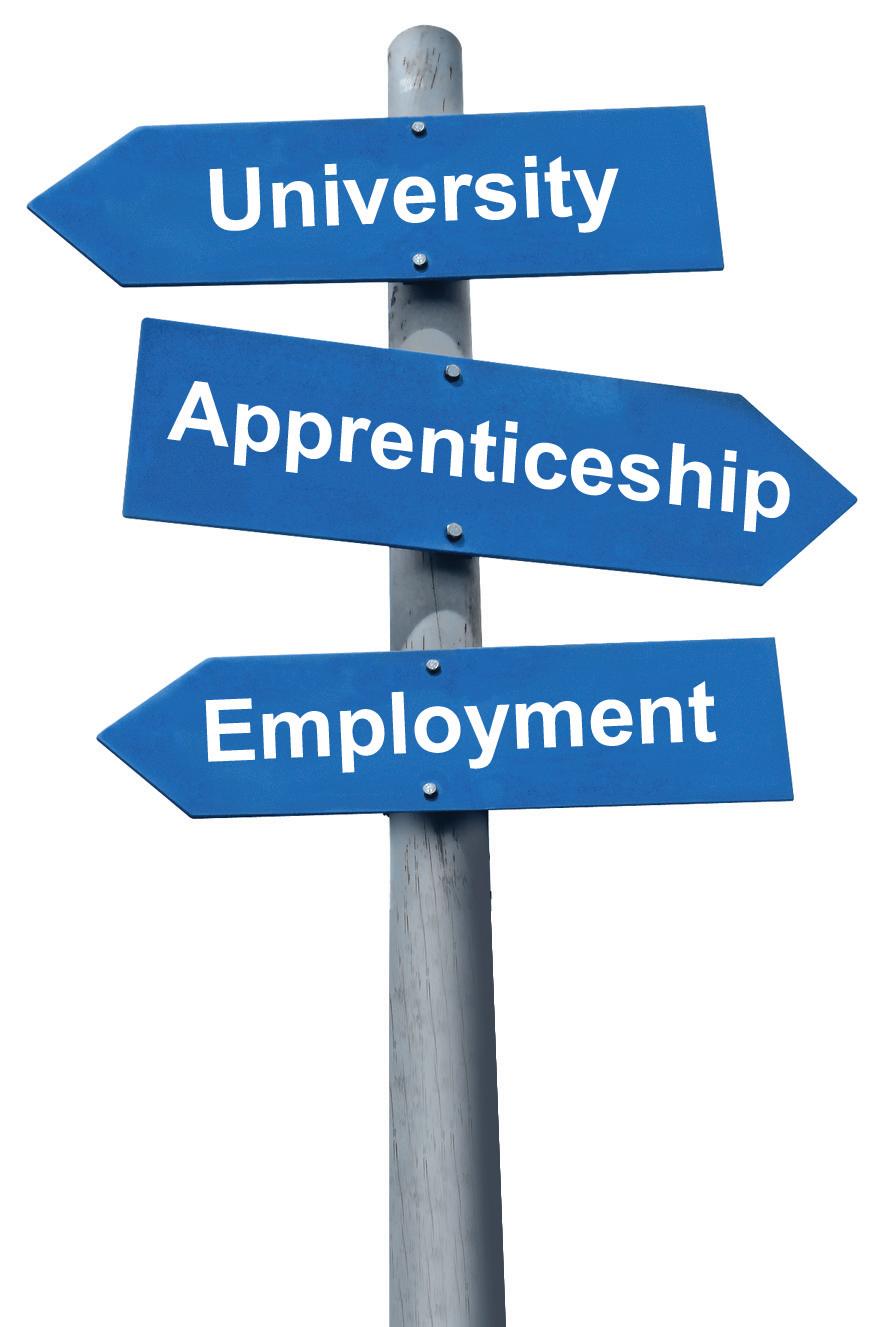




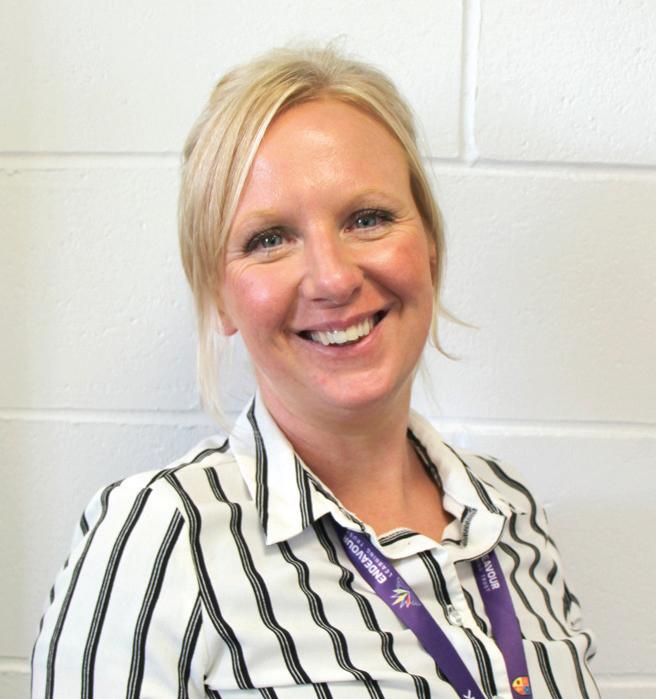
Welcome to Ormskirk Sixth Form, I am delighted that you are considering joining us. We have been supporting students in achieving their academic goals for 21 years. We provide a rigorous programme of study whilst also ensuring that each student in our care is treated as an individual and is provided with the support and the environment that they need to be happy, settled and thrive. The atmosphere in the College is friendly and informal but with a high focus on achieving academically.
Our Sixth Form is built around a set of core values:
• Inclusion – we value and know every student as an individual
• Aspiration – we strive to be the best that we can be
• Support – we ensure all students are supported in such a way that they can flourish and be their best
• Respect – we respect each member of our community as well as our Sixth Form and local community
Being at Sixth Form is a crucial development period personally as well as academically. This is why your study programme will be built around your needs and ambitions. We offer an extensive programme of individual support, academic mentoring and individualised enrichment to build your’ confidence and prepare you for your next steps. We ensure that you have contact to a variety of external agencies including universities, apprenticeship providers as well as employers so that you have the opportunity to explore your options, be inquisitive and make informed decisions.
We have a staff of extremely experienced, dedicated and enthusiastic teachers together with class sizes that facilitate frequent individual help and attention. Personal tutors and our pastoral team are always available to guide you through every step of your journey with us.
Ormskirk Sixth Form is all about team work. Staff and students build positive relationships and work together to ensure that you leave us prepared for your next steps and fully equipped to deal with an ever-changing world.
Mrs Blackhurst, Director of Sixth Form
14 AQA Art & Design A-Level in Fine Art
16 AQA Art & Design A-Level in Graphic Communication
18 A Level Biology
20 BTEC Level 3 Extended Certificate Business
22 A Level Chemistry
24 A-Level Computer Science
26 BTEC Level 3 Extended Certificate in Information Technology
28 AQA A-level Design and Technology: Product Design
30 Cambridge Technicals In Digital Media (Level 3)
32 A Level Drama & Theatre
34 A-Level English Language
36 A-Level English Literature
38 AQA Art & Design A-Level in Textile Design
40 Level 3 Food Science and Nutrition Program
42 A-Level Geography
44 BTEC National Level 3 Extended Certificate in Health & Social Care
46 A-Level History
48 Languages: A-Level Spanish and French
50 A -Level Maths and Further Maths
52 BTEC Level 3 National Extended Certificate in Music Performance
54 A-Level in Physical Education
56 A-Level Philosophy & Ethics
58 A-Level Physics
60 Pearson BTEC Level 3 National Extended Certificate in Sport
62 A-Level Psychology (AQA)
64 A-Level Sociology
66 Sixth Form Leaver’s Destinations 2023
The teachers are so supportive. In Sixth Form the work is hard and it is a big step from GCSE but I feel so supported and cared for that I know I can do it
We value achievement in its widest sense, academically, personally and socially. In the Sixth Form we are committed to providing a high quality, forward looking and caring educational experience which enables all our students to achieve their full potential.
Our extensive range of enrichment activities helps all students develop new skills.
We have high expectations of our students, studying at Ormskirk is demanding and advanced level work can be challenging but it is also exciting, rewarding and often fun.
The college offers a wide range of courses including a mix of traditional A-level disciplines and BTEC level 3 courses. All courses offer the same high quality of resources, teaching and support that ensures students are prepared for further study or employment.
There is a programme of additional support for our Gifted and Talented students. They are encouraged to study AS level Critical Thinking, EPQ in Year 13 and apply for courses within their sphere of A-level specialism at Villiers Park Educational Trust, Cambridge.
High quality teaching ensures that each student receives the degree of support and challenge required to fulfil their potential. Staff have very high expectations of their students and work with them to improve performance since our group sizes are relatively small. Students are able to receive individual attention, discussing progress at regular intervals. All students have a personal tutor who will guide students from induction to decisions regarding university and employment.
We have an extensive programme designed to support students as they make their higher education choices and we have well established links with Admissions Tutors in a wide variety of universities. We have a dedicated Careers Officer to support students who are considering alternatives to further study.
It is testament to the hard work and commitment of our students and staff that this year’s results build on the excellent outcomes achieved last year. 80% of entries achieved a C grade or above. Over 50% of our A Level students achieved 3 A*-C grades, with a further increase in the proportion of A* and A grades resulting in an average grade per entry of a ‘B-‘. Students following applied general and vocational courses also continued to achieve excellent outcomes, with an average grade per entry of a ‘Merit+‘. It is also pleasing to note our 100% pass rate.
At Ormskirk Sixth Form I am a person, not a number. The staff really know me and how best to support me.
I’m really enjoying Sixth Form, my subjects are super fun and informative. I definitely picked the subjects that I love. The study spaces are useful and the teachers are really supportive and helpful. The food is great
I feel at home here. Its friendly and welcoming and a place where I can be myself.
We are supported really well but also given lots more freedom. I can go into Ormskirk or home to study if I don’t have lesson.
Why Choose Sixth Form?

In Sixth Form we are treated as young adults. We are given much more freedom that we are in school but we also feel looked after in a small Sixth Form with a lovely family feel
that allow for the individual attention that you need when studying A levels
Very welcoming. Teachers do everything they can to support you.
changed each year to meet what our students want
Learning about politics and our world is really interesting and such an eye opener, we have really good discussions.
We had a few visits to universities and apprenticeship fairs within the first few weeks of year 12.


You could join us our exciting trips to
It allows me to read for pleasure but also delve deeper into the books and understand them from other people perspective.
This helps me keep fit, meet new people and compete.
I can produce a portfolio on anything that interests me and get UCAS points for it to help me get to Uni.
We all have an interest in working in the medical field. This session gives us a real understanding of our options and how best to prepare for them.
this helps me get my thoughts and feeling onto paper so that I can understand them more clearly
this helps me work on projects as part of a team that improve our local community
this helps me hold a conversation in the language spoken by nearly 115 million people, also order a meal and drink while on holiday

“it’s a safe space no judgement from anyone! - More Freedom”
“couldn’t imagine being anywhere else for A-Levels”
My first impressions of sixth form are good so far. I really like how small the classes are as I feel like I can benefit more from this in my lessons and get good feedback. The great food is also a bonus.
I’m really enjoying my time at sixth form so far. Even though it’s such a big step away from what I’m used to, it excites me.
There’s a much more relaxed feel here in college and I’m starting to gain a lot more independence.
“The
study rooms are incredibly useful for some quiet study away from the energy-filled atrium and every teacher is supportive and friendly”
Of course, it is not just about exams. The vibrant sixth form encourages students to immerse themselves not only in their academic studies but also in the many enrichment opportunities on offer, helping them develop new skill, interests and friendships. These are just a few examples
• British sign language level 1
• Mentor training to support year 7 students
• Duke of Edinburgh Gold Award
• Sport
• Public speaking
• Volunteer work

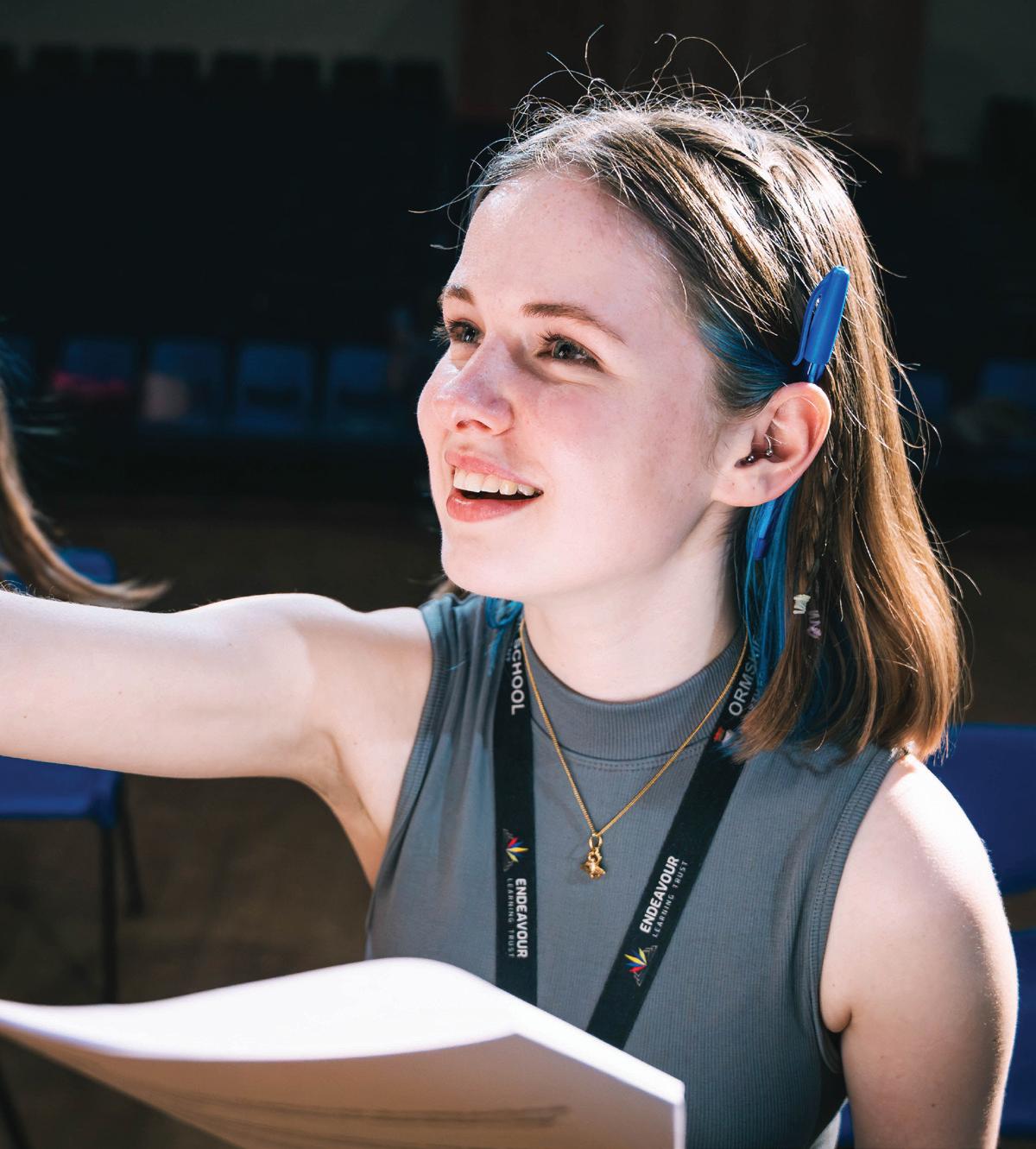
“I love sixth form because it feels like a new adventure everyday”
Here to make sure you are having a great time and making some fantastic memories. Study is important but you will study better if you are happy and confident. Social events that include all will help that happen.
Here to make sure that all Sixth Form students are feeling well and strong and in the best possible position to take on the challenges that Sixth Form and teenage life can throw at you. Wellbeing ambassadors encourage students to practice ‘selfcare’ and look after their mind and body.
Here to help us give to our community and the wider world. Your charity ambassador will work with you to identify charities that are close to our community and sixth form heart. They will lead us in supporting them as best as we can.
Here to look after our school and Sixth Form environment as well as that of our local community. Small changes can make a big difference and our Environment ambassadors are always looking for how we can reduce our schools footprint to embed good habits and impact future generations.
Here to help our Sixth Form to connect with others in the local community. Looking to work with local businesses and our primary feeder schools to see how we can help bring our diverse community together.
The facilities that we have here in Sixth Form are fantastic, from the relaxed study space that is the atrium to the individual study rooms throughout, there is always somewhere to complete work
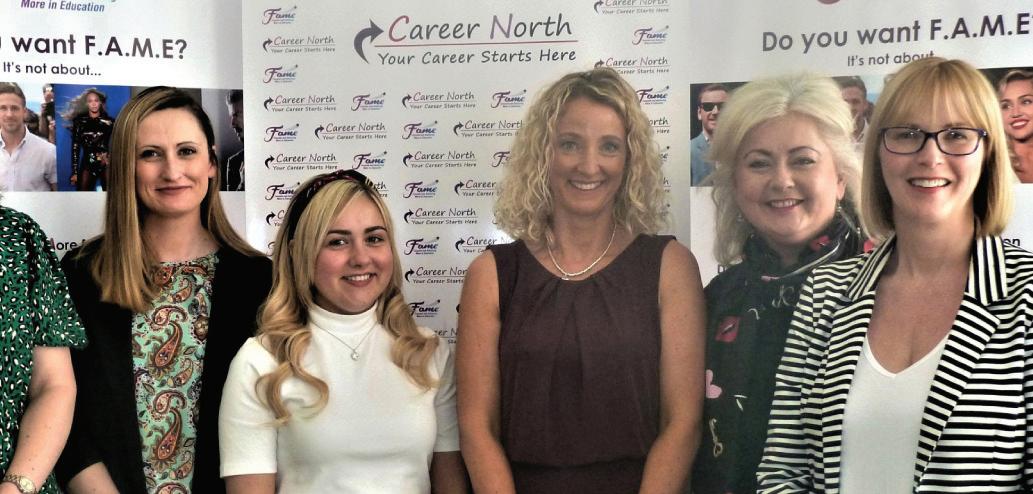
not only are they brilliant teachers but they are very supportive and are always happy to help.
The support I’ve had during my time at Ormskirk Sixth Form College has been amazing, the transition is definitely harder than I thought but I’ve always had someone to go to when I’ve been struggling. Can’t say I’ve ever felt like I’m on my own or have no one to go to.
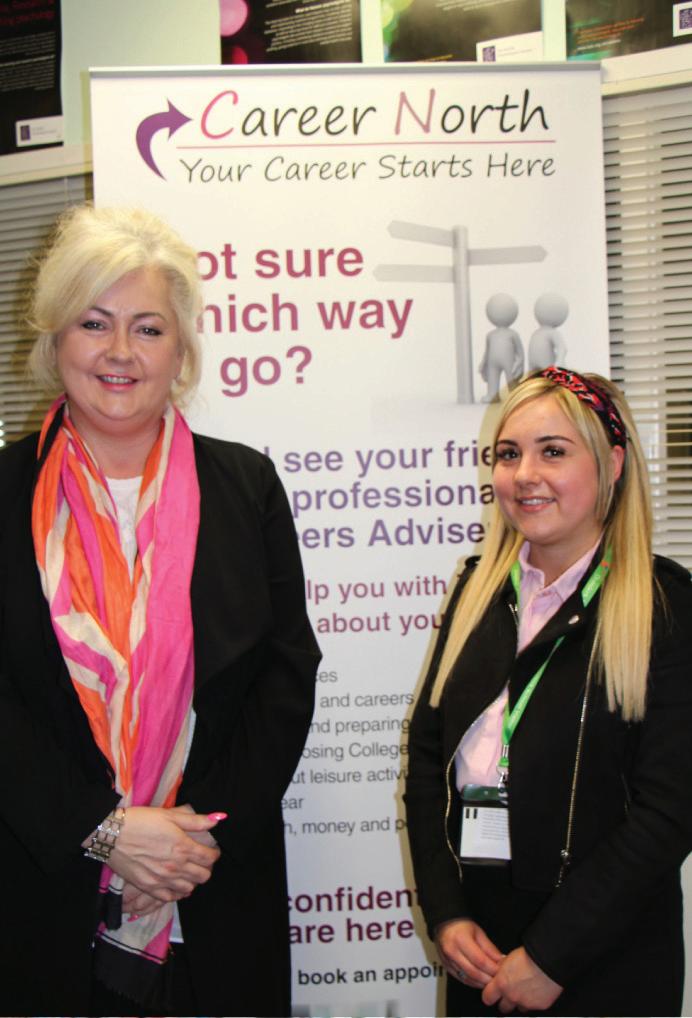
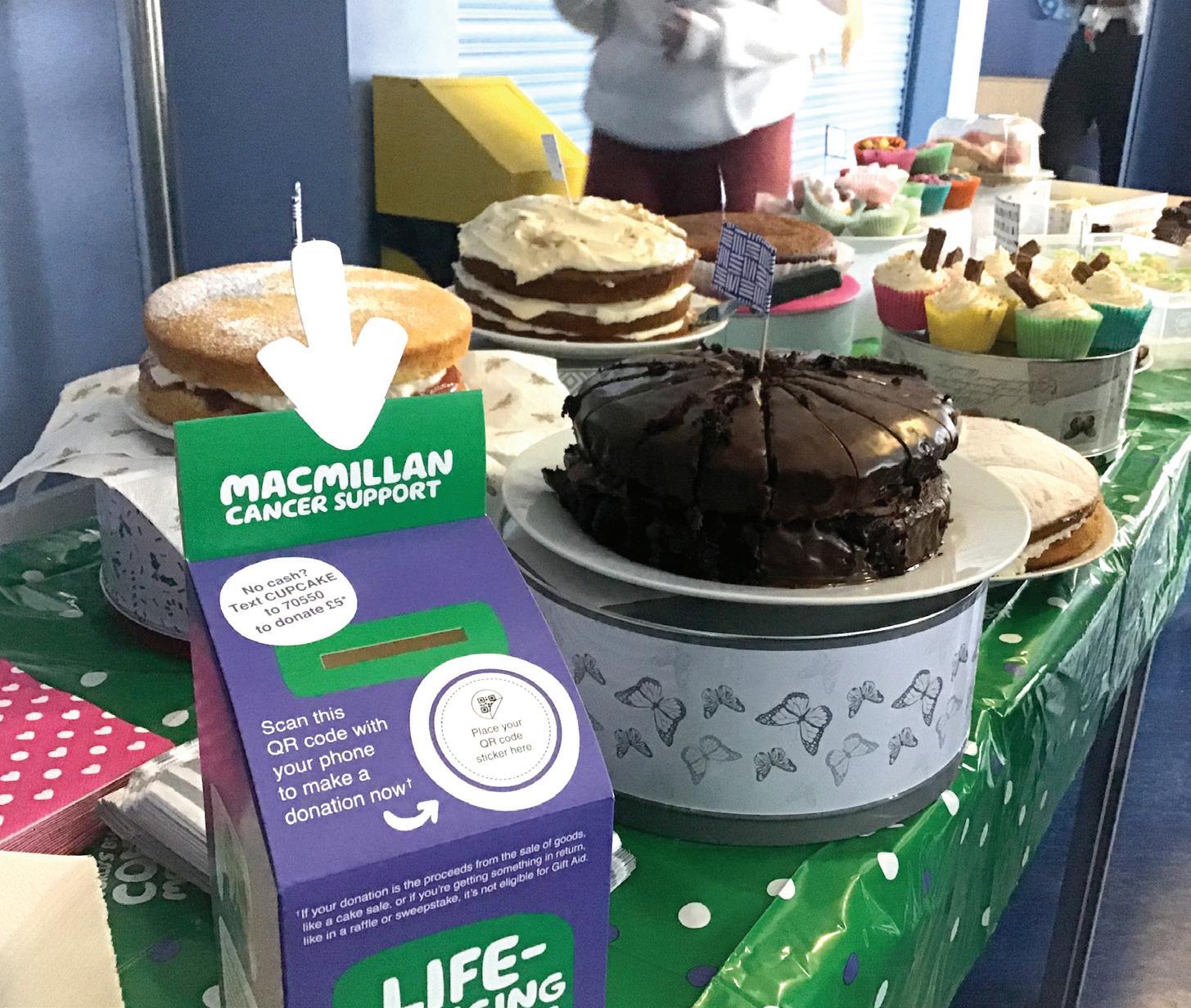

Charity means a lot to all the staff and students at sixth form and is taken very seriously. Whenever a charity event is set up or discussed everyone is keen and very enthusiastic to get involved. Charity is really important to sixth form and this year our chosen charity is Macmillan. We all think it’s so important to support a charity so close to many people within sixth form and one that’s helped so many people and families.
We come up with so many different ideas to raise as much money as possible.
We have days where we dedicate breaks and lunch times to selling cakes that the students have made themselves. We set up tables and have money boxes on entry to the sixth form block for donations. We have students who volunteer to sit at the tables at break and lunch encouraging people to buy cakes and raise as much money as possible for charity.
Another way we have raised a lot of money for charity is with a sponsored head shave. This one event raised over £600 for MacMillan.
Days where pupils come in dressed in one colour such as red for red nose day and fancy dress for Halloween are both ways we raise money.
We have had people in to deliver assemblies when they speak to the whole of sixth form about what happens with all the money we have raised and how much it helps the charity out. These assemblies are really moving and touch the hearts of all the students there as it shows everyone what we’ve achieved as a family and the difference we’ve made for people going through a tough time in their lives. This is one of the main reasons charity is so important to sixth form because the outcome is so amazing.

Students should be introduced to a variety of experiences that explore a range of fine art media, processes and techniques. They should be made aware of both traditional and new media.
Students should explore the use of drawing for different purposes, using a variety of methods and media on a variety of scales. Students may use sketchbooks/workbooks/journals to underpin their work where appropriate.
Students should explore relevant images, artefacts and resources relating to a range of art, craft and design, from the past and from recent times, including European and non-European examples. This should be integral to the investigating and making processes. Students' responses to these examples must be shown through practical and critical activities that demonstrate their understanding of different styles, genres and traditions.
Students should be aware of the four assessment objectives to be demonstrated in the context of the content and skills presented. They should be aware of the importance of process as well as product.
Students are required to work in one or more area(s) of Fine art, such as those listed below.
They may explore overlapping areas and combinations of areas:
• drawing and painting
• mixed-media, including collage and assemblage
• printmaking (relief, intaglio, screen processes and lithography)
• moving image and photography
• sculpture
• ceramics
• installation
Component 1 – 60% -Coursework portfolio, including 3,000 word essay
Component 2 – 40% - Exam project with a 15 hour final exam
5 GCSE at min grade 5 including 5 in GCSE Art


Fine Art is a step towards a huge range of creative careers
• Art Gallery Director
• Art Historian
• Freelance Artist
• Tattoo Artist
• Web Designer
• Video Game Designer
• Creative Director
• Makeup Artist
• Interior Designer
• Animator
• 3d Designer
• Architect
• Graphic Designer Stylist
• Theatre Set Designer
• Art Therapist
• Photographer
• Fashion Designer
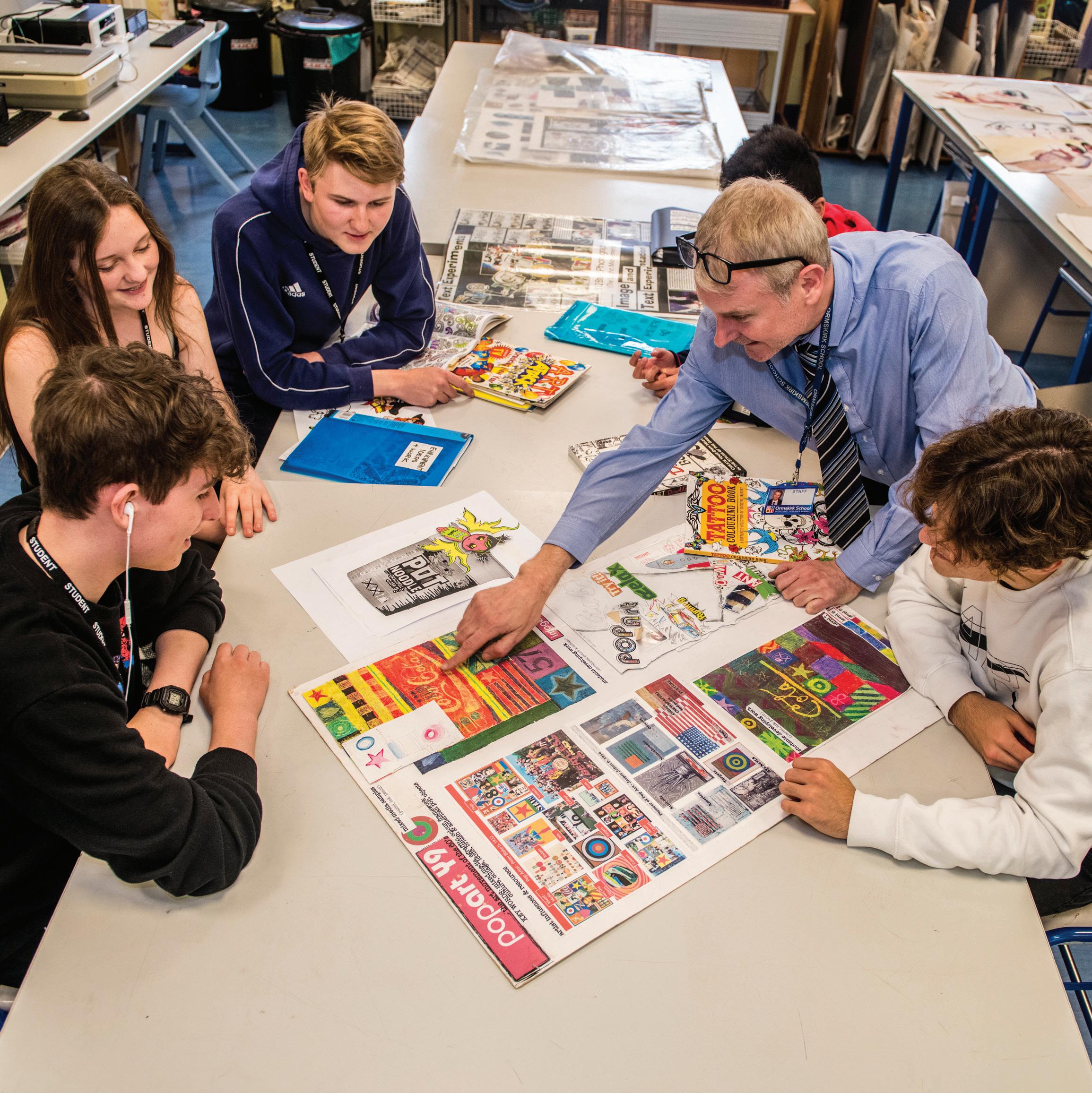
‘I took Graphic Art at Sixth Form as I hope to go to a university and study the subject and go on to do graphic design in the future.’
‘I enjoy Graphic Art and would like to go forward to do history of art or if not, graphic design and the A-level course will help towards that.’
‘I took Graphic Art because in the future I would like to work in the film and media industry and the skills that I have learnt and developed will help when at university and the working industry.’
‘I took Graphic Art because I would like to go into architecture and the skills I have learnt will be useful at University.
Students should be introduced to a variety of experiences that explore a range of graphic communication media, processes and techniques. They should be made aware of both traditional and new media.
Students should explore the use of drawing for different purposes, using a variety of methods and media on a variety of scales. Students may use sketchbooks/workbooks/journals to underpin their work where appropriate.
Students should explore relevant images, artefacts and resources relating to a range of art, craft and design, from the past and from recent times, including European and non-European examples. This should be integral to the investigating and making processes. Students’ responses to these examples must be shown through practical and critical activities that demonstrate their understanding of different styles, genres and traditions.
Students should be aware of the four assessment objectives to be demonstrated in the context of the content and skills presented. They should be aware of the importance of process as well as product. Students are required to work in one or more area(s) of Graphic communication, such as those listed below. They may explore overlapping areas and combinations of areas:
• interactive media
(including web, app and game design)
• advertising
• packaging design
• design for print
• illustration
• communication graphics
• branding
• multimedia
• motion graphics
• design for film and television
Component 1 – 60% -Coursework portfolio, including 3,000 word essay
Component 2 – 40% - Exam project with a 15 hour final exam
5 GCSE at min grade 5 including 5 in GCSE Art

Graphic Communication is a step towards a huge range of creative careers
• Art Gallery Director
• Art Historian
• Freelance Artist
• Tattoo Artist
• Web Designer
• Video Game Designer
• Creative Director
• Makeup Artist
• Interior Designer
• Animator
• 3d Designer
• Architect
• Graphic Designer Stylist
• Theatre Set Designer
• Art Therapist
• Photographer
• Fashion Designer
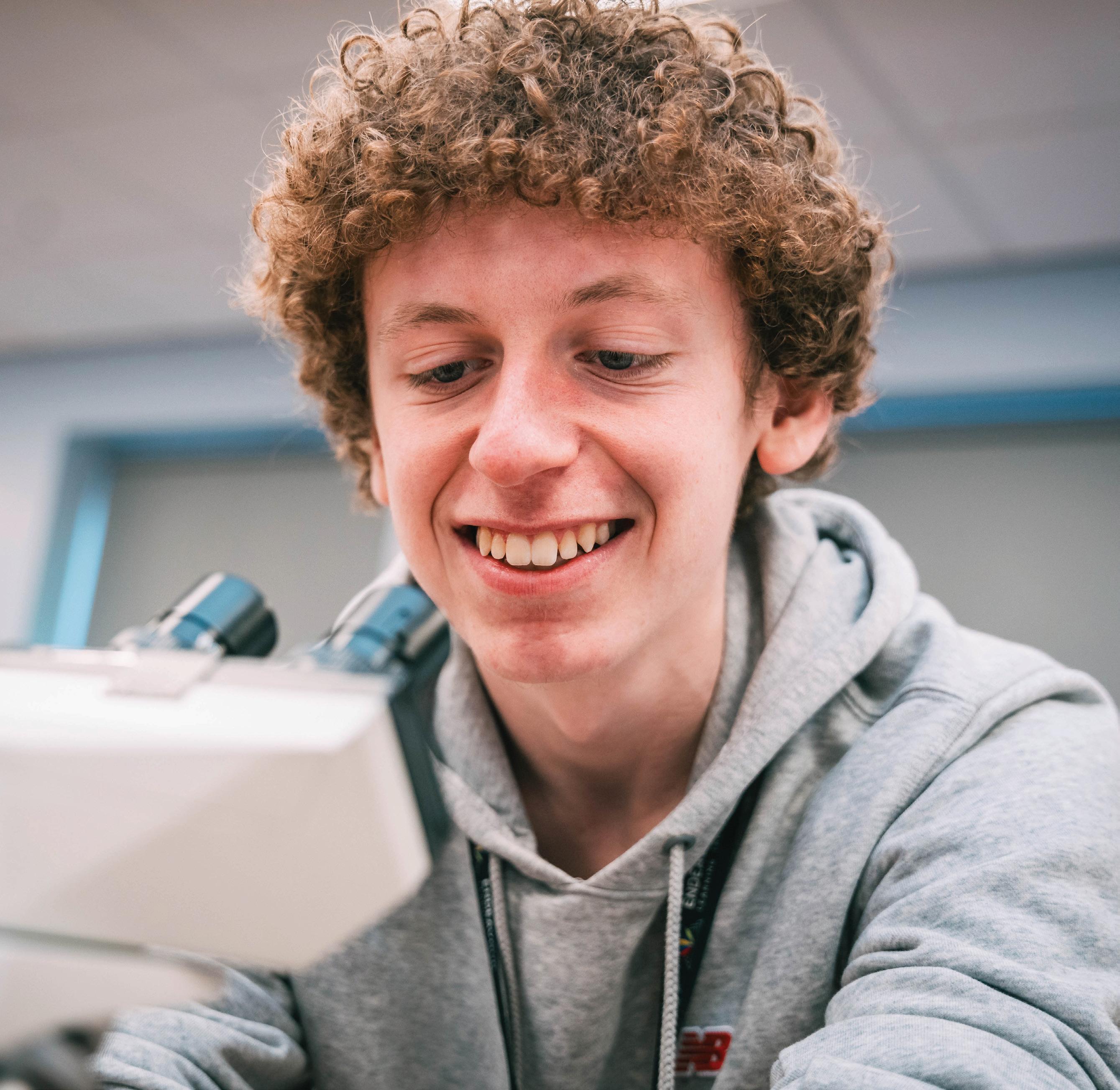
A level Biology lasts two years, with exams at the end of the second year.
In Year 1 you will study fundamental principles of Biology. These are split into four areas:
• Cells – including eukaryotic and prokaryotic cell structure, cell membranes and transport, cell division and immunity.
• Biological molecules – including carbohydrates, proteins (and enzymes), lipids, DNA/RNA and ATP.
• Exchange – including gas exchange, digestion, heart and circulation, haemoglobin and plant transport.
• Variation – including DNA, protein synthesis, genetic diversity, meiosis, selection, taxonomy and biodiversity.
In Year 2 more complex principles are covered. These are again split into four areas:
• Energy transfers – including photosynthesis, respiration, energy in ecosystems and nutrient cycles.
• Response – including tropisms, taxes, kinesis, receptors, control of heart rate, nerves, muscles and homeostasis.
• Genetics and evolution – including inheritance, populations, speciation and ecosystems.
• Gene expression – including mutations, regulation of gene expression, stem cells, recombinant DNA technology, genetic screening and fingerprinting.
There is no coursework in A level Biology, however your performance during practicals will be assessed. There are three exams at the end of Year 13, with 15% of the marks coming from questions relating to the required practicals.
Paper 1 covers topics 1-4 (Year 12 topics). There are 91 marks available and this contributes 35% to the final grade.
Paper 2 covers topics 5-8 (Year 13 topics). There are 91 marks available and this contributes 35% to the final grade.
Paper 3 is the synoptic paper and covers all 8 topics, including a 25 mark essay. There are 78 marks available and this contributes 30% to the final grade.
Biology, like all sciences, is a practical subject. Throughout the course you will carry out practical activities, which if completed to the correct standard will be rewarded by achieving the practical endorsement for the subject.
There are twelve compulsory practical investigations that students complete over the two years. These cover a range of practical areas, including microscopy, enzyme action, dissection, colorimetry, ecology and chromatography.
The practical endorsement demonstrates an ability to investigate and analyse a range of problems, which further education establishments and employers are looking for in candidates.
5 GCSE at min grade 5 including 6 in GCSE biology
A level Biology can lead on to a wide range of degree courses, including Biology, Biomedical Sciences, Biochemistry, Earth Science, Environmental science, Forensic science, Physiotherapy and Sports science.
Biology offers a wide range of career options, both through the topics themselves and also because of the practical and investigative nature of the subject. Career options include:
• Marine biology
• Zoology
• Medicine
• Pharmacy
• Physiotherapy
• Microbiology
• Scientific Journalist
• Biotechnologist
• Higher Education Lecturer
• Nanotechnologist
• Nature Conservation
• Pharmacologist
• Research Scientist
• Scientific Laboratory
• Technician
• Teacher
• Soil Scientist
• Dental Hygienist
• Dentist
• Physician Associate
• Science Writer
• Veterinary Science and many more.
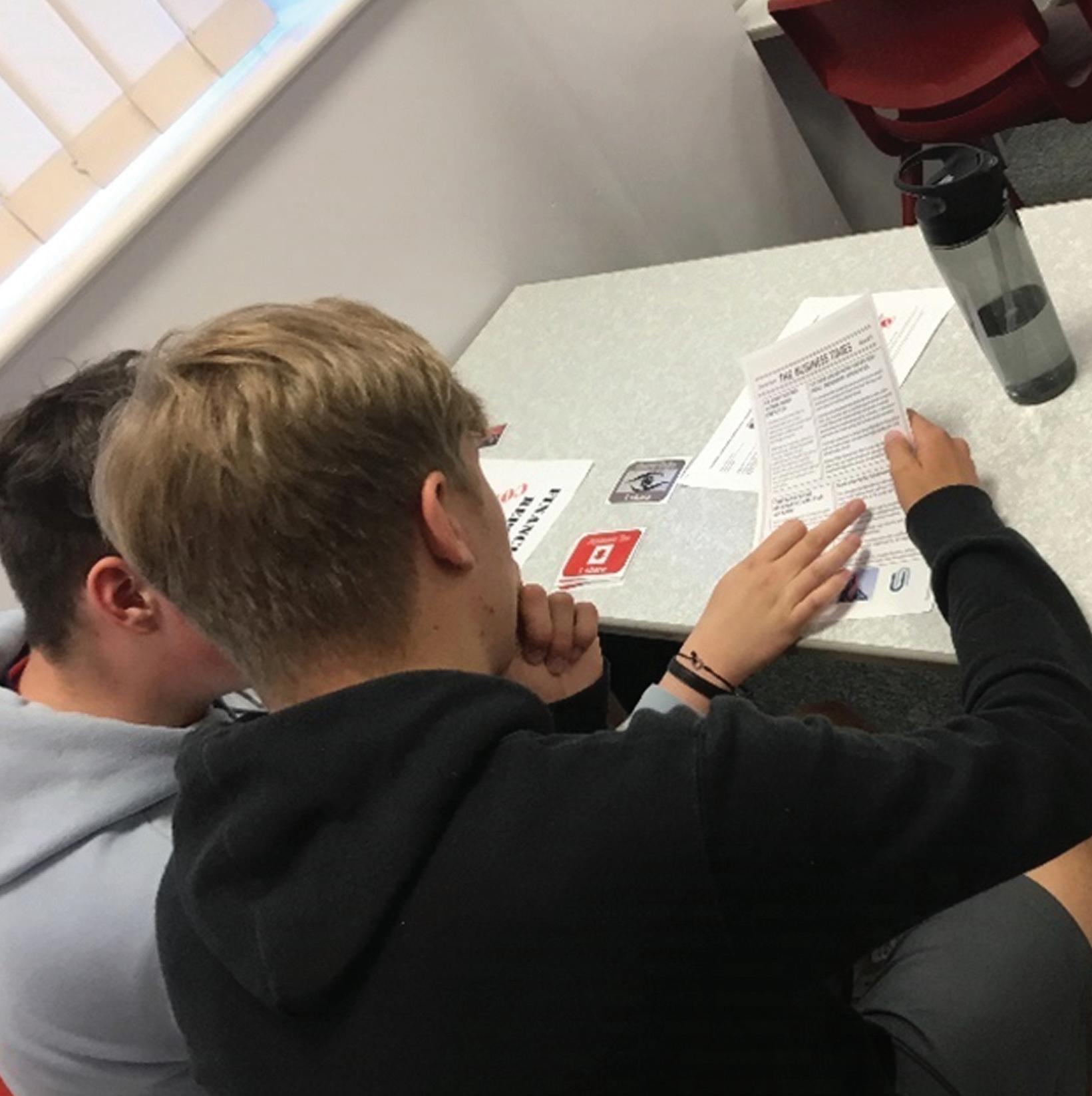
How would you like to be the next successful entrepreneur? Or perhaps work for a multinational company or have a career in leadership and management? BTEC Business will give you an amazing insight into the real world of business. This course aims to provide you with the best start to many different career paths. These include: HR, Finance, Marketing and Production, with the opportunity to work both in the UK and internationally. The BTEC National Extended Certificate in Business is for students wanting to continue their education through applied learning, and who aim to progress to an apprenticeship, further education or employment. There is a combination of examined and coursework units that you will complete over the two years.
The extended certificate in Business is for learners who are interested in learning about the business world alongside other fields of study. The qualification consists of four units across the two years, three of which are mandatory and two are external. This qualification has been designed alongside Business employers, so this is what these are skills that are transferable to the outside world.
Unit 1: Exploring Business (Internal)
Unit 2: Developing a Marketing Campaign (External)
Unit 3: Personal and Business Finance (External)
Unit 8: Recruitment and Selection Process (Internal)
4 GCSE min grade 4 including Business and Maths or English
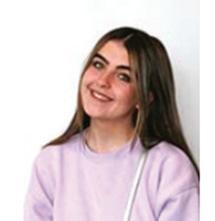
Business studies at Ormskirk Sixth Form is amazing, the teaching staff are so supportive and help you with literally anything you need. The class sizes really allow you to create a working relationship with the people around you and make friends you never thought you would make in main school. Studying Business has given me subject knowledge and confidence to pursue a career in Business after Sixth Form. Business has allowed me to think outside of the box and set me up with life skills that are essential for a future in Business Management.
Business is a varied and useful subject and can provide a solid foundation for various careers.
A few of these include:
• Market Research
• Advertising
• Sales
• Accountant
• Production Manager
• Quality Control Manager
• HR Assistant/Manager
• Management Consultant
• Business Studies Teacher
• Self Employed ...are you the next Alan Sugar?

A-level Chemistry lasts two years, with exams at the end of the second year. The table below shows what you’ll learn in each year.
Physical chemistry
Including atomic structure, amount of substance, bonding, energetics, kinetics, chemical equilibria and Le Chatelier’s principle
Inorganic chemistry
Including periodicity, Group 2 the alkaline earth metals, Group 7(17) the halogens
Organic chemistry
Including introduction to organic chemistry, alkanes, halogenoalkanes, alkenes, alcohols, organic analysis
Physical chemistry
Including thermodynamics, rate equations, the equilibrium constant Kp, electrode potentials and electrochemical cells
Inorganic chemistry
Including properties of Period 3 elements and their oxides, transition metals, reactions of ions in aqueous solution
Organic chemistry
Including optical isomerism, aldehydes and ketones, carboxylic acids and derivatives, aromatic chemistry, amines, polymers, amino acids, proteins and DNA, organic synthesis, NMR spectroscopy, chromatography
There is no coursework on this course. However, your performance during practicals will be assessed. There are three exams at the end of the two years for A-level, all of which are two hours long. At least 15% of the marks for A-level Chemistry are based on what you learned in your practicals.
Chemistry, like all sciences, is a practical subject. Throughout the course you will carry out practical activities including:
• measuring energy changes in chemical reactions
• tests for identifying different types of compound
• different methods for measuring rates of reaction
• studying electrochemical cells
• preparation of organic solids and liquids
• an advanced form of chromatography for more accurate results.
5 GCSE at min grade 5 including 6 in GCSE chemistry
A-level Chemistry attempts to answer the big question ‘what is the world made of’ and it’s the search for this answer that makes this subject so fascinating. From investigating how one substance can be changed drastically into another, to researching a new wonder drug to save millions of lives, the opportunities that chemistry provides are endless.
According to bestcourse4me.com, the top five degree courses taken by students who have an A-level in Chemistry are:
• Chemistry • Biology • Pre-clinical medicine • Mathematics • Pharmacology.
Studying an A-level Chemistry related degree at university gives you all sorts of exciting career options, including:
• Analytical Chemist
• Chemical Engineer
• Clinical Biochemist
• Pharmacologist
• Doctor
• Research Scientist (physical sciences)
• Toxicologist
• Chartered Certified Accountant
• Environmental Consultant
• Higher Education Lecturer
• Patent Attorney
• Science Writer
• Science Teacher


Computer Science is a practical subject where students can apply the academic principles learned in the classroom to real world systems. It is an intensely creative subject that combines invention and excitement, that can look at the natural world through a digital prism. In Computer Science we value computational thinking, helping students to develop the skills to solve problems, design systems and understand the power and limits of human and machine intelligence.
Assessed through a written exam at the end of year 13. Students will learn about contemporary systems architecture, input/output and storage devices, software and software development, programming, exchanging data, data types structures and algorithms and the legal, moral and ethical issues of Computing Science.
Assessed as a separate exam paper at the end of year 13 student will learn the elements of Computational Thinking, programming and problem solving, pattern recognition, abstraction and decomposition, algorithm design and efficiency
Students select their own user driven problem of an appropriate size and complexity to solve. Students will analyse their problem, design a solution, implement it and give a thorough evaluation.
5 GCSE’s at a minimum grade 5, including a 5 in Computer Science or Maths.
• Games Developer
• Cloud Architect
• Computer Forensic Investigator
• Health It Specialist
• Mobile Application Developer
• Web Developer
• Technical Support Specialist
• Information Technology
• Vendor Manager
• Data Modeller
• Teacher
• Software Engineer
• Database Program Designer
• Multimedia Programmer
• IT Manager
• IT Consultant
This vocational pathway offers you the chance to understand how IT is used in the modern workplace. You will develop valuable knowledge and real world skills in areas such as cyber security, web design and data management. All this is delivered with a hands on predominantly coursework focused approach where you can apply your skills to meet a range of scenarios. In IT we value and develop digital literacy and the ability to confidently navigate a range of software packages to achieve a desired outcome. In a 21st century workplace this course equips learners with a range of transferable skills and attributes that they can draw on in their next steps.
Students will study the role of Information Technology (IT) systems and the implications of their use in personal and professional situations. Students will gain knowledge and understanding of issues relating to the use of IT in personal and professional situations
Students will study cyber security threats and vulnerabilities, the methods used to protect organisations against threats and managing security incidents.
Students will investigate fundamental principles in website development. They will design and develop a website in response to a client brief.
Students will examine relational database development principles to understand the importance of data storage and normalisation techniques and apply their skills to design and develop data storage solutions to meet a client’s requirements.
Some of our previous students who completed this course have gone on to study cyber security and IT systems and secured employment in the IT industry. You can use the skills in this course to help you become a web designer / data analyst and much more!
4 GCSE’s at a minimum grade 4, including a Merit in GCSE IT and Maths or English.

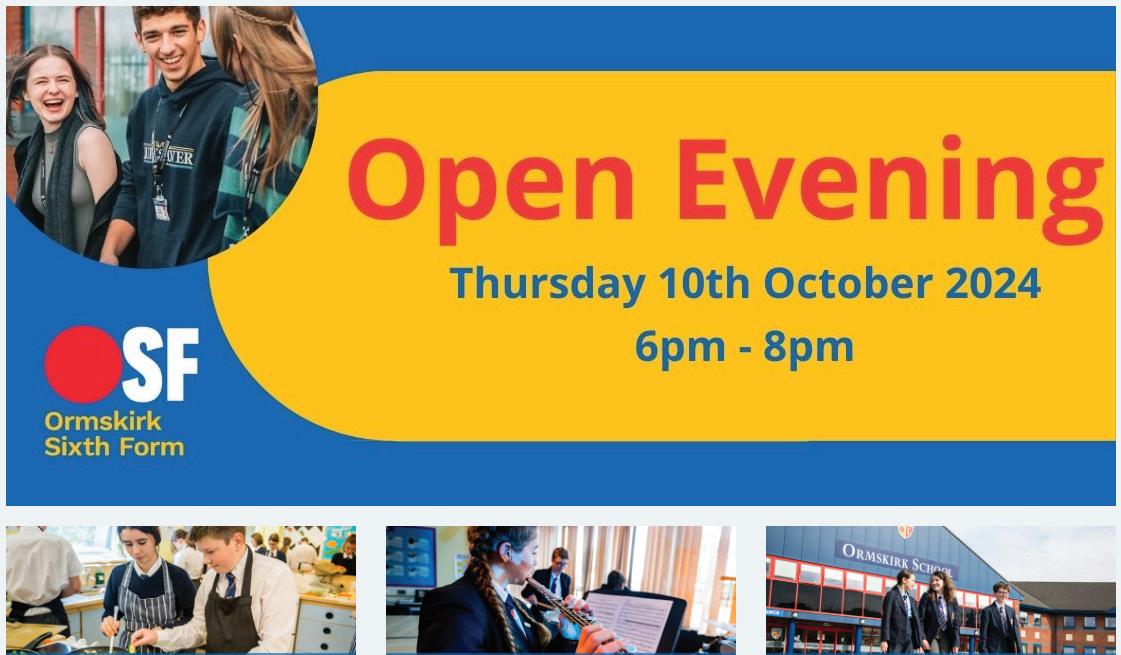
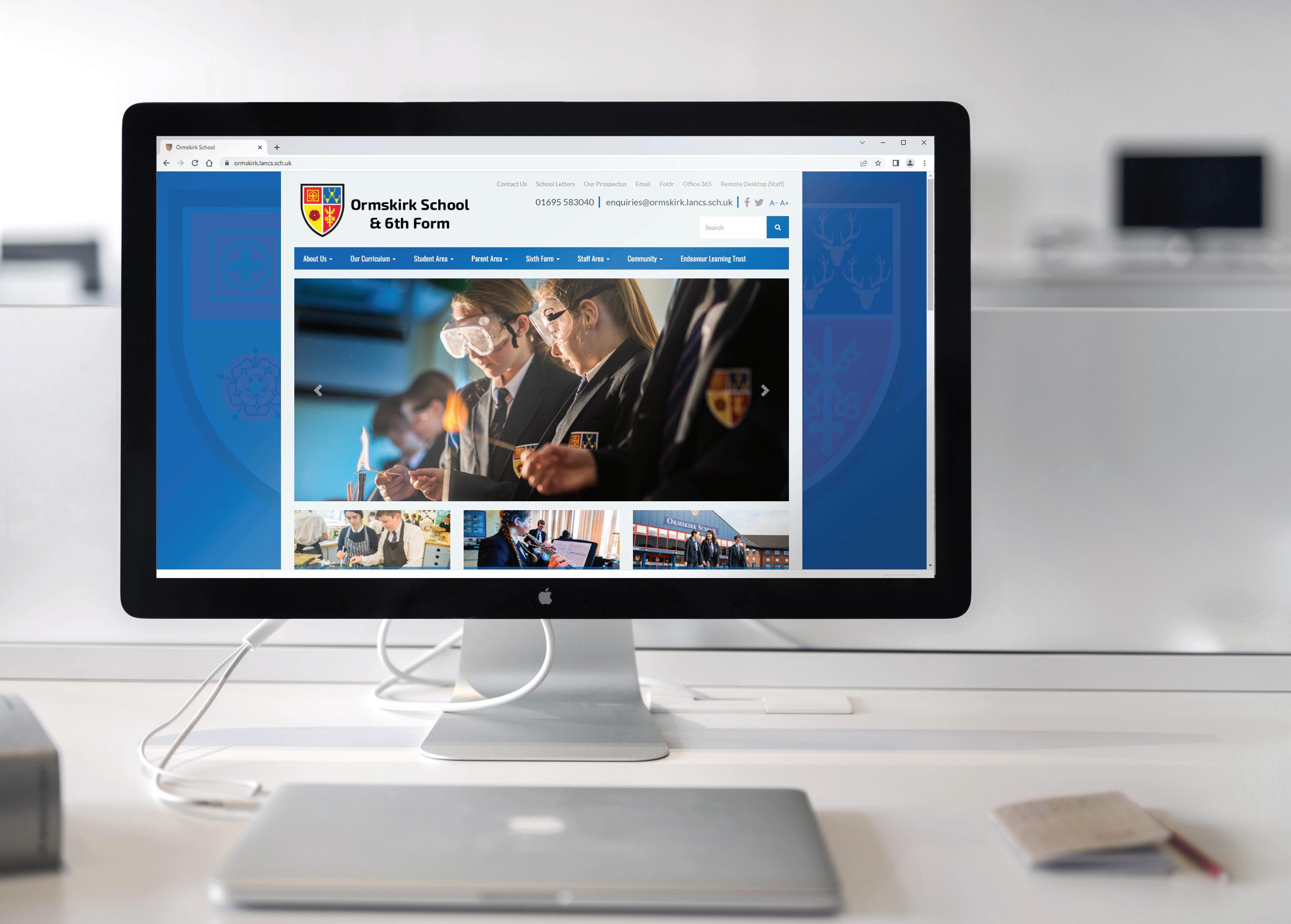


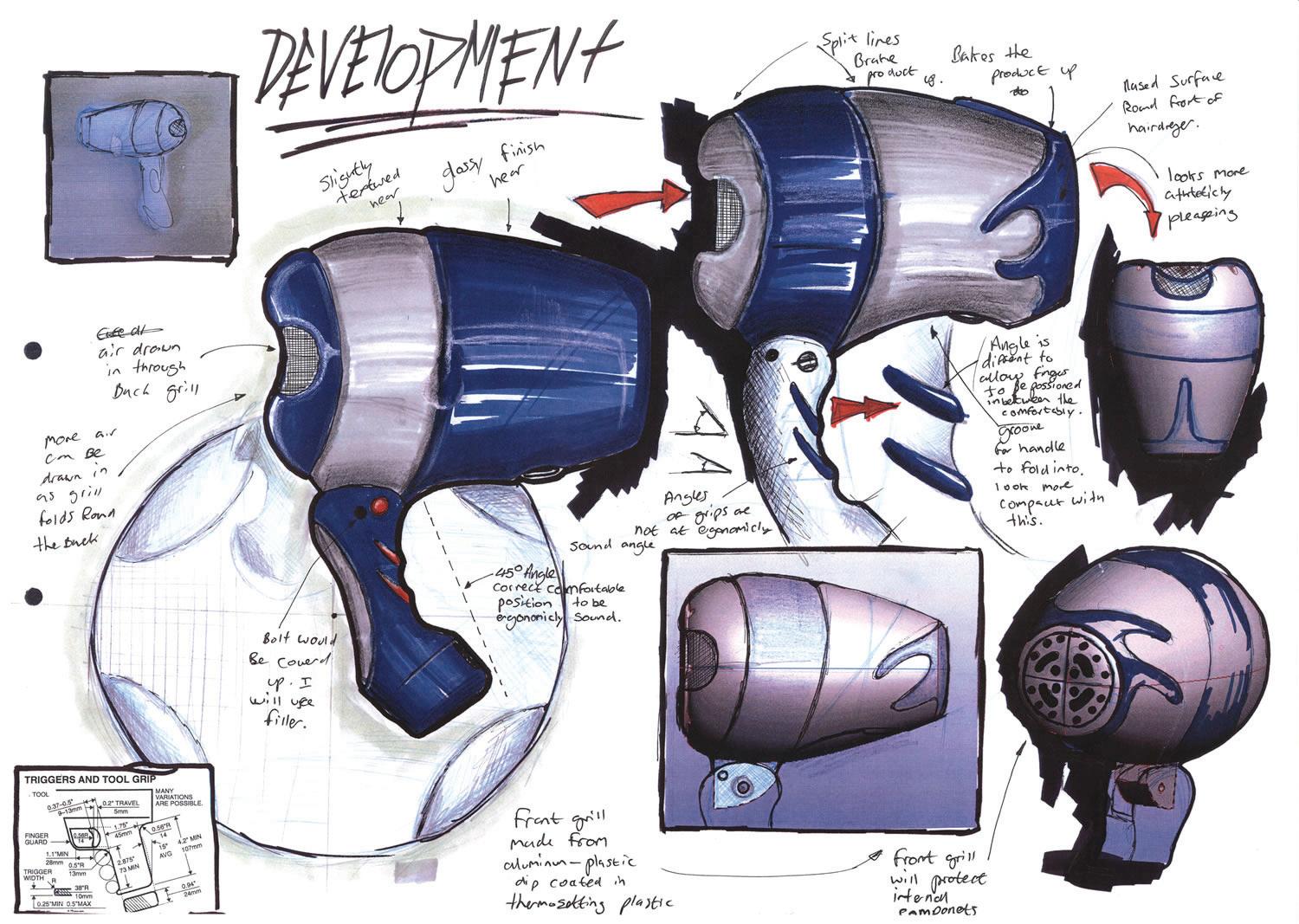
course is designed to provide students with an in-depth understanding of designing and creating products, exploring materials, manufacturing processes, and the impact of design on society.
This course aims to develop students’ understanding of design principles, materials, and manufacturing techniques while encouraging creative thinking and problem-solving in product design. Students will explore real-world design challenges, develop design solutions, and evaluate their effectiveness.
Module 1: Design Principles and Theory
Introduction to Design Thinking
Design Movements and History
Design Principles and Elements
Ergonomics and Anthropometrics
Environmental and Social Responsibilities in Design
Module 2: Materials and Processes
Properties and Selection of Materials
Material Testing and Analysis
Manufacturing Processes (e.g., CAD/CAM, Injection Molding, 3D Printing)
Sustainability and Recyclability in Materials
Product Lifecycle Analysis
Market Research and User-Centered Design
Product Performance Evaluation
Design for Manufacture and Assembly (DFMA)
Module 4: Commercial and Industrial Practice
Designing for Mass Production
Intellectual Property and Copyright in Design
Costing and Pricing Strategies
Prototyping and Iterative Design
Module 5: Design Project
Individual Design Project - Identification and Analysis of Design
Problem Research, Conceptualisation, and Initial Design Proposals
Development and Refinement of Design Concepts
Final Design Realization and Evaluation
Written Examinations Assessing theoretical knowledge in design principles, materials, and processes.
Paper one:
• Technical principles
• Written exam: 2 hours and 30 minutes
• 120 marks
• 30% of A-level:
Paper two:
• Designing and making principles
• Written exam: 1 hour and 30 minutes
• 80 marks
• 20% of A-level:
NEA (Non-examined assessment): Design project with a portfolio documenting research, development, and final design outcomes.
Practical application of technical, designing and making principles. Assessment of practical skills demonstrated in design and manufacture.
• Substantial design and make project
• 100 marks
• 50% of GCSE:
Textbooks and Journals on Design and Technology
CAD Software and Modelling Tools
Access to Manufacturing Facilities and Workshops
Guest Lectures from Industry Professionals
Design exhibitions, trade shows, and industry visits
Design Thinking and Creativity
Research and Analysis
Critical Thinking and Problem-Solving
Practical Design and Manufacturing Skills
Project Management and Time Management
The AQA A-level Design and Technology: Product Design course equips students with the necessary skills and knowledge to pursue careers in various design-related fields and fosters an understanding of the impact of design on society and the environment.
A Level Design and Technology (DT) qualification can open up various career pathways, focusing on design, technology, engineering, and related fields. Here’s a list of careers associated with A Level DT:
1. Product Design Engineer: Developing and creating new products, working on design concepts, and bringing innovative ideas to life.
2. Architect: Designing buildings, structures, and spaces with a focus on aesthetics, functionality, and safety.
3. Industrial/Product Designer: Crafting the appearance and functionality of various consumer and industrial products, from electronics to furniture and more.
4. Mechanical Engineer: Designing and improving mechanical systems, such as engines, tools, and machinery.
5. Civil Engineer: Planning, designing, and overseeing the construction of infrastructure like roads, bridges, and buildings.
6. Graphic Designer: Creating visual concepts using computer software or by hand to communicate ideas that inspire, inform, or captivate consumers.
7. Fashion Designer: Designing and creating clothing, accessories, or footwear.
8. Interior Designer: Planning and designing interior spaces to make them both functional and aesthetically pleasing.
9. Automotive Engineer: Developing and designing vehicles and their systems, focusing on innovation and functionality.
10. Furniture Designer/Craftsperson: Crafting furniture pieces and creating designs for interior spaces.
11. 3D Printing Specialist: Working with cutting-edge technology to create prototypes and products using 3D printing.
12. Materials Engineer: Studying and developing materials used in various products, from their initial creation to application.
13. CAD Technician: Using Computer-Aided Design software to produce technical drawings for construction and manufacturing projects.
14. Jewellery Designer: Creating designs for various types of jewellery, including precious stones and metals.
15. Design and Technology Teacher/Educator: Sharing knowledge and skills by teaching design and technology in educational institutions.
16. Prototype Developer: Working to create and test prototypes for various products and systems.
17. Environmental Designer: Focusing on sustainable and environmentally friendly design solutions.
18. UX (User Experience) Designer: Creating interfaces and experiences for digital products that are user-friendly and visually appealing.
19. Toy Designer: Designing toys and games for entertainment or educational purposes.
20. Design Journalist/Writer: Reporting and writing about design trends, products, and innovations for various publications.

A refreshing and exciting course that is up to date, engaging, fit for purpose and suitable for the needs of todays students interested in digital content production. This course has An extensive range of project based assessed units with practical and wider project-based assessment opportunities, as well as examined units on media products and audiences, pre-production and planning, social media and globalisation, and research for product development.
You will develop your understanding of how different media institutions operate in order to create products that will appeal to specific target audiences. You will therefore learn about the different ownership models in the media industries, and you will learn how to analyse different media products within the sector to understand the fundamentals of how meaning is created for audiences. You will learn about how audiences are categorised, researched and targeted by media producers and how media institutions distribute and advertise their products to audiences.
You will understand the preproduction process that the creative media industry follows when creating a product. You will learn how to carry out research in the planning stage of a media production and about the various acts of legislation that need to be considered. You will learn about the constraints that need to be considered when planning a new media production, including timescales and resources. You will understand how to create pre-production documents in relation to client requirements and how to plan projects to meet these needs.
You will learn to plan and produce a media product. You will complete planning materials to take them forward in the production and post–production stages of your intended media product. You will plan, produce and edit original content for your intended product by creating a proposal to meet a client brief, producing planning materials, creating and managing original content for your product and applying editing techniques.
You will evaluate the positive and negative impacts of social media on businesses, individual users and producers. You will also learn about issues surrounding censorship and regulation of social media, and the impact this has on media production and distribution. You will fully investigate how media producers use contemporary social media to generate ideas, fund and plan projects with other professionals and how social media is used commercially to create awareness and advertise products to global audiences.
4 GCSE’s at grade 4 or above.

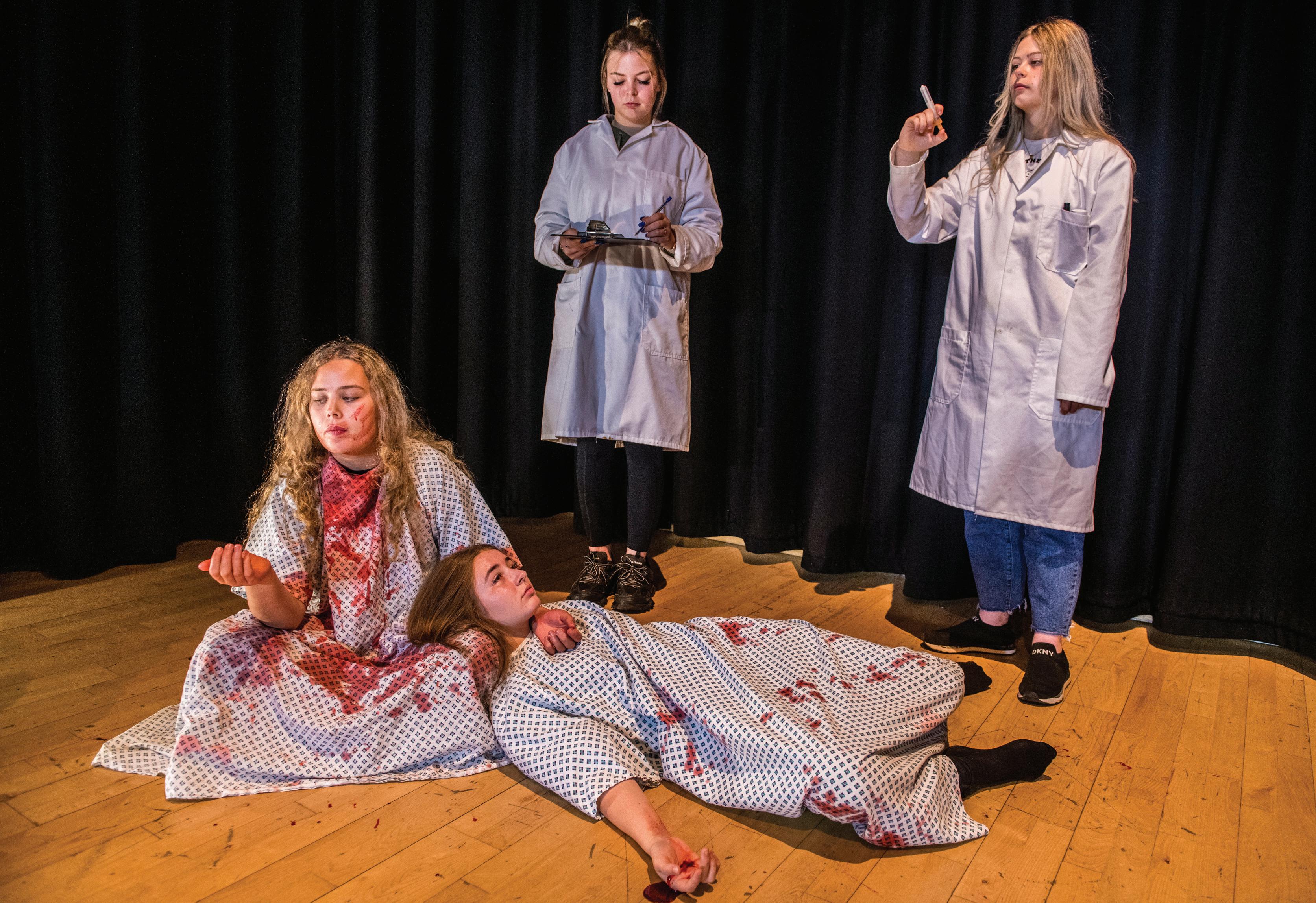



Students can pursue their interests and develop their skills in a range of practical and theoretical drama elements including acting, directing, costume and lighting. The requirements of the specification, with its 70% written paper and coursework elements enable students to gain a valuable qualification for courses in higher education. The content of the A level follows through from that of the AQA GCSE Drama and AQA Performing Arts specifications, enabling a smooth transition from one to the other. At the same time it must be emphasised that GCSE is not a requirement for students wishing to take the A level course.
The subject content for A level Drama and Theatre is divided into 3 components:
1. Drama and Theatre
2. Creating Original Drama
3. Making Theatre
Component 1 – Drama and Theatre:
3 hour exam with open books – 40% of A level, marked out of 80.
Knowledge and understanding of Drama and theatre is developed by studying 2 set texts. The exam also includes analysis and evaluation of the work of live theatre makers.
SECTION A – 1 Question about one set text (25/80)
SECTION B - 3 Questions about the other set text (30/80)
SECTION C - 1 Question on the work of theatre makers in a single live production seen (25/80)
Component 2 – Creating original Drama:
Practical exam – 30% of A level.
The process of creating devised drama is assessed & students perform a devised performance which has been influenced by the work or methodologies of one practitioner.
Working notebook (40/60 marks)
Devised performance (20/60 marks)
Practical exam – 30% of A level. Students will practically explore and interpret 3 extracts each taken from a different play. Methodologies of a practitioner must be applied to extract 3 (final assessed piece). A reflective report analysing and evaluating theatrical interpretation must be submitted to the exam board. Performance of extract (40/60 marks) Reflective report (20/60 marks)
5 GCSE at min grade 5 including 5 in Theatre studies
The support that the teachers at 6th form gave me was incredible. The facilities are amazing- better than some of the professional spaces I’ve worked in! I would highly recommend the course.

Anthony graduated from the prestigious ArtsED London with a BA (Hons) in Musical Theatre. Anthony continues to work in the professional industry and has performed on the West End as well as in regional theatres, UK tours and European tours.
Theatre Studies A level is regarded as a valued academic qualification in all British universities and may serve as a springboard to many varied careers such as:
• Actor
• Lawyer
• Author
• Marketing
• Theatre Historian
• Community Arts Worker
• Costume Designer
• Set Designer
• Dancer
• Drama therapist
• Music Therapist
• Theatre Director
• Broadcast presenter
• Film Director
• Teaching
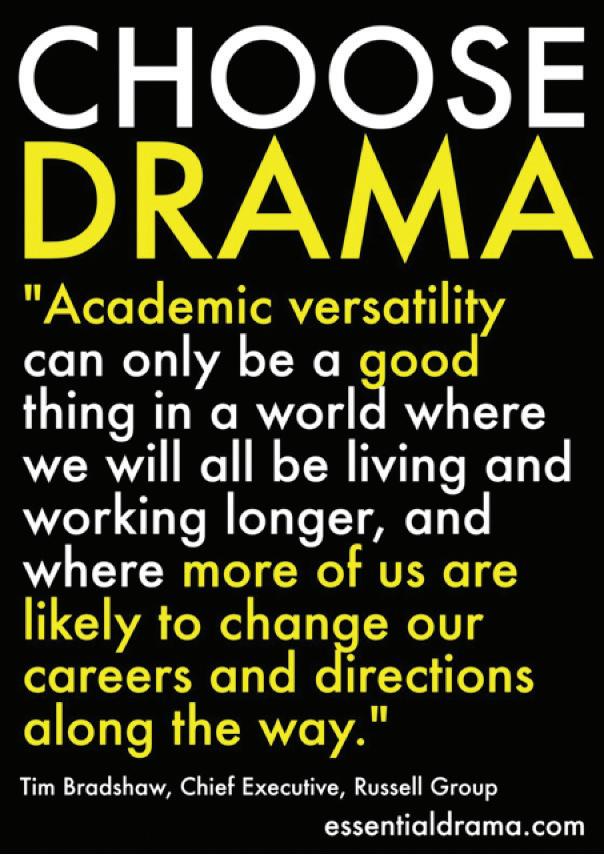

The reasons that I chose to do English Language is because I have always had an interest in the subject and wanted to have a further understanding of it. During the sixth form open day, I really enjoyed the English language taster lesson and decided that it was the right subject for me.
Up to now, I have really enjoyed the lessons and the topics that we have been learning about. I have particularly enjoyed learning about how the English language has changed over time and I have also quite enjoyed doing the course work that comes with the subject, I am very glad that I chose it.
(2 hours 15 mins) (35%)
Two questions on:
• how language varies depending on mode, field, function and audience
• how language choices can create personal identities
• language variation in English from c1550
(the beginnings of Early Modern English) to the present day.
(1 hour) (20%)
One question on:
• spoken language acquisition and how children learn to write between the ages of 0 and 8
• the relationship between spoken language acquisition and literacy skills that children are taught, including the beginnings of reading
• appropriate theories of children’s language development
Component 3: Language Investigation
(1 hour 45 mins) (25%)
Two questions: Students will:
• select a research focus from five topic areas
• develop their research and investigation skills
• undertake a focused investigation
• apply their knowledge of language levels and key language concepts developed through the whole course
• develop their personal language specialism. A subtopic will be pre-released in the January before the examination. The pre- released subtopic will provide a steer for students’ research and investigation to enable them to prepare for the external assessment.
(20%)
Students produce two written assignments:
• Assignment 1: two pieces of original writing from the same genre, differentiated by function and/or audience.
• Assignment 2: one commentary, reflecting on the two pieces of original writing produced and making connections with research undertaken.
English Language will enable students to:
• develop and apply their understanding of the concepts and methods appropriate for the analysis and study of language
• explore data and examples of language in use
• engage creatively and critically with a varied programme for the study of English
• develop their skills as producers and interpreters of language
• independently investigate language in use.
5 GCSE at min grade 5 including 5 in GCSE English language
The reasons that I chose to do English Language is because I have always had an interest in the subject and wanted to have a further understanding of it. During the sixth form open day, I really enjoyed the English language taster lesson and decided that it was the right subject for me. Up to now, I have really enjoyed the lessons and the topics that we have been learning about. I have particularly enjoyed learning about how the English language has changed over time and I have also quite enjoyed doing the course work that comes with the subject, I am very glad that I chose it.
English studies provide opportunities for students to develop the skills necessary for a wide range of careers, including those directly related to creative writing and media.

Component 1: Drama (2 hours 15 mins) (30%)
one Shakespeare play and one other drama from either tragedy or comedy – both texts may be selected from one or both of these categories. critical essays related to their selected Shakespeare play.
Component 2: Prose (1 hour) (20%)
two prose texts from a chosen theme. At least one of the prose texts must be pre-1900.
Component 3: Poetry (2 hours 15 mins) (30%)
Students study: poetic form, meaning and language (unseen) a selection of post-2000 specified poetry and a specified range of poetry from: either a literary period (either pre- or post-1900) or a named poet from within a literary period.
Component 4: Coursework (20%)
Students have a free choice of two texts to studymust be complete texts and may be linked by theme, movement, author or period. Can be prose, poetry or drama.
Pearson Edexcel Level 3 Advanced GCE in English Literature will enable students to:
• read widely and independently set texts and others that they have selected for themselves
• engage critically and creatively with a substantial body of texts and ways of responding to them
• develop and effectively apply their knowledge of literary analysis and evaluation
• explore the contexts of the texts they are reading and others’ interpretations of them
• undertake independent and sustained studies to deepen their appreciation and understanding of English literature, including its changing traditions
5 GCSE at min grade 5 including 5 in GCSE English Literature
I chose English Literature because the poems and books that you study throughout the course educate you, not only on the literature itself, but social issues from the time period that are still highly relevant in present day.
I have enjoyed English Literature from a young age as I find that is allows you to experience life through so many different characters eyes in the novels and plays that you read. It’s almost like an escape from the real world. I chose to do English Literature at A-level because it can lead you down so many pathways and open so many doors leading to various opportunities. English Literature is such a broad subject and can lead on to any degree. So I think that if you are somebody who is unsure of what they want to do after your A-levels, English Literature is a really strong subject to have.
English has helped me understand the power of words and how the great writers use these words to create something incredible, a piece of art. English can open many doors in your future and is one of the most useful and versatile A-levels you can take.
English Literature is considered to be a facilitating subject and is largely respected by Universities when applying for many degree courses.
English studies provide opportunities for students to develop the skills necessary for a wide range of careers.

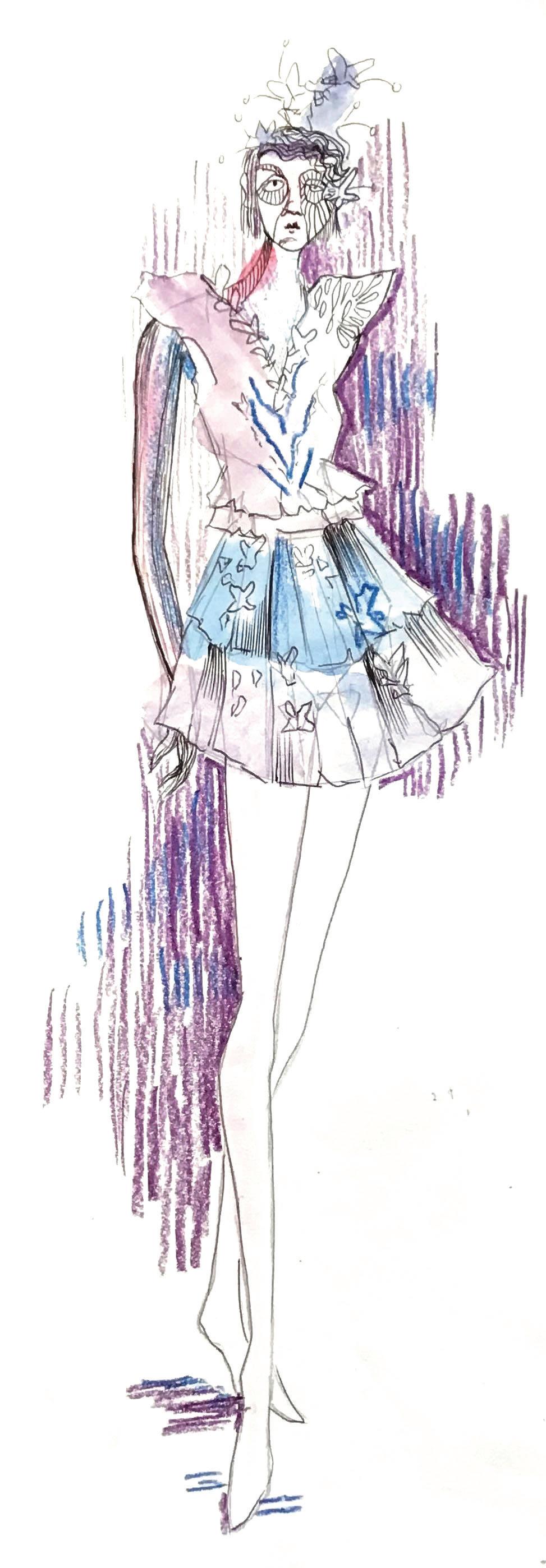
Students will be introduced to a variety of experiences that explore a range of textile media, processes and techniques. They should be made aware of both traditional and new media.
Students should explore the use of drawing for different purposes, using a variety of methods and media on a variety of scales. Students may use sketchbooks/workbooks/journals to underpin their work where appropriate.
Students should explore relevant images, artefacts and resources relating to a range of textile art, craft and design, from the past and from recent times, including European and non-European examples. This should be integral to the investigating and making processes. Students’ responses to these examples must be shown through practical and critical activities that demonstrate their understanding of different styles, genres and traditions.
Students should be aware of the four assessment objectives to be demonstrated in the context of the content and skills presented. They should be aware of the importance of process as well as product.
Students are required to work in one or more area(s) of Textiles, such as those listed below. They may explore overlapping areas and combinations of areas:
• Fashion Design
• Fashion Textiles
• Costume Design
• Digital Textiles
• Printed and/or dyed fabric and materials
• Domestic textiles and wallpaper
• Interior design
• Constructed textiles
• Art textiles
• Installed textiles
Component 1 – 60% -Coursework portfolio, including 3,000 word essay
Component 2 – 40% - Exam project with a 15 hour final exam
5 GCSE at min grade 5 including 5 in GCSE Art

• Freelance Artist
• Creative Director
• Interior Designer
• 3d Designer
• Graphic Designer
• Stylist
• Theatre Costume Designer
• Photographer
• Fashion Designer
• Printmaker
• Fashion Illustrator




Our Level 3 Food Science and Nutrition qualification is tailored to provide students with a solid foundation for pursuing higher education and careers in the food industry and related fields. This course outlines a comprehensive program that equips learners with the necessary knowledge and skills to excel in the realm of food science and nutrition.
Knowledge of food science and nutrition holds significance across various industries and job positions. This knowledge is applied by healthcare providers and hospital nutritionists, as well as by sports coaches and fitness trainers. Similarly, in the hospitality sector, including hotels and restaurants, as well as in food manufacturing and government agencies, this knowledge is utilized for crafting menus, food products, and policies that promote healthy eating initiatives. Students in the field of food science and nutrition have numerous career prospects awaiting them.
By studying for this certificate alongside other relevant qualifications at Level 3 e.g. GCE Biology, Physical Education, Sociology, learners will gain the required knowledge to use the qualification to support entry to higher education courses such as:
• BSc Human Nutrition
• BSc (Hons) Public Health Nutrition
• BSc (Hons) Food Science and Technology
Our Level 3 Food Science and Nutrition program offers a solid educational foundation and a pathway to a successful future in this dynamic and vital field. Join us and embark on your journey towards a promising future in food science and nutrition.
Unit 1
Meeting Nutritional Needs of Specific Groups (Internal and External)
Unit 2
Ensuring Food is Safe to Eat (External)
Unit 3
Experimenting to Solve Food Production Problems (Optional)
Unit 4
Current Issues in Food Science and Nutrition (Optional)
5 GCSE’s at minimum Grade 5, including a grade 5 in Food Preparation and Nutrition
Chef
Food Technologist
Health And Safety
Inspector
Nutritional Therapist
Nutritionist
Product/Process
Development Scientist
Production Manager
Quality Manager
Regulatory Affairs Officer
Secondary School
Teacher
Technical Brewer
Procurement Manager
Research Scientist (Life Sciences)
Scientific Laboratory
Technician
Toxicologist


The A-Level Geography course gives you a strong foundation for understanding the 2 main themes of the subject: human geography and physical geography. Between them, they’re what makes our planet tick. Human geography deals with how people and the environment interact and the way we both exist. It also looks at how people and groups move and live in the world around us. For example, you will learn about things you see in the papers and on the news everyday, including issues of sustainability. Physical geography on the other hand, is all about the scientific aspects of our world with an emphasis on how we can manage them. The end result of studying human and physical geography is that you will have a better understanding of how people and the world work together.
• Geography tackles the big issues and finds solutions to today’s problems.
• It combines well with a variety of other subjects.
• Geography graduates are the most employable because of the wide range of skills gained through geography.
• Transferable skills – map reading, data collection and analysis, GIS, problem solving, teamwork and communication.
Paper 1
2 hours 15 minutes
The assessment is out of 105 marks The assessment consists of 3 sections.
Content Assessed:
• Section A assesses Area of study 1, Topic 1: Tectonic Processes and Hazards
• Section B assesses Area of study 1, Topic 2: Landscape Systems, Processes and Change. This includes two optional sub-topics from which students choose one:
2A Glaciated Landscapes and Change or 2B Coastal Landscapes and Change.
• Section C assesses Area of study 3, Topic 5: The Water Cycle and Water Insecurity and Topic 6: The Carbon Cycle and Energy Security.
Paper 2
2 hours 15 minutes
The assessment is out of 105 marks The assessment consists of 4 sections.
Content Assessed:
• Section A assesses Area of study 2, Topic 3: Globalisation
• Section B assesses Area of study 4, Topic 7: Superpowers
• Section C assesses Area of study 2, Topic 4: Shaping Places. This comproses two optional sub-topics from which students choose one: 4A Regenerating Places or 4V Diverse Places.
• Section D assesses Area of study 4, Topic 8: Global
Development and Connections. This comprises two optional sub-topics from which students choose one: 8A Health, Human Rights and Intervention or 8B Migration, Identity and Sovereignty.
Paper 3
2 hours 15 minutes
The assessment is out of 70 marks
Content Assessed:
• Synoptic assessment of geographical skills, knowledge and understanding (within a place based context) from compulsory content drawn from different parts of the course.
Non-examination assessment: Independent Investigation
• The student undertakes an independent Investigation, producing a written report of 3000- 4000 words.
• The student defines a question or issue relating to the compulsory or optional content
• The student’s investigation will incorporate fieldwork data (collected individually or as part of a group) and own research and/or secondary data.
• The report will evidence independent analysis and evaluation of data, presentation of data findings and extended writing.
• The report is internally assessed and externally moderated
• The independent investigation report must be submitted at the end of the course.
4 GCSE grade 4 including maths or English
Anywhere on Earth! There are many careers that require geography including:
• Development Work
• Cartography
• Teaching
• International Aid
• Geochemist
• Ecologist
• Tree Surgeon
• Environmental Health Officer
• Research Scientist
• Town planner
• Landscape architect

The BTEC National in Health and Social Care is a vocational qualification that will help prepare you for a wide range of careers or for further study on a range of degree programmes. There are many roles available in the Health and Social Care sector which provide varied opportunities to make a difference to people’s lives in a positive way – and the demand for skilled people is growing. Working in the Health and Social Care professions can also take you to different parts of the country and overseas. Whether you are thinking of pursuing a career in nursing, healthcare science or social work, the BTEC National in Health and Social Care includes pathways that will help you to fulfil your ambition. Once you have completed your studies, whatever you choose to do you will be doing a job that is varied, rewarding and worthwhile.
In your BTEC National in Health and Social Care, you will be studying a range of units, which will help you to gain skills that will be valuable in your chosen profession or future study. You will learn about the human body and how it changes over time. You will also learn about what it means to work in the sector and what skills and behaviours you will need to demonstrate, and the importance of respecting the individual differences and needs of service users.
I chose health and social care because I knew what career path I wanted to go down, but didn’t have three options to choose. Health and social care has allowed me to widen my knowledge on communication skills and presenting my work professionally.
For virtually all careers in the health and social care sector, you will need to have the following skills:
• Good communication skills
• Good interpersonal skills
• The ability to work well as a member of a team
• Cognitive and problem-solving skills
• Presenting yourself professionally
• The ability to manage your time effectively.Studying for the BTEC National in Health and Social Care allows you to practise all of these skills utilising different styles of learning. You will encounter and appreciate various methods to assess your understanding and knowledge of the different subject areas.
For BTEC, you will develop thinking processes that require you to
• Recall knowledge and information
• Understand, apply and analyse it so that you can judge how important or valuable something is, and
• Create new ideas.
These thinking processes will underpin your assignments and assessments.
Each of the components of the course are marked with a Pass, Merit, Distinction. These convert to points, on completion of the 4 components your score will be added up to give you your overall Level which again will be in a Pass, Merit, Distinction or distinction*. For UCAS this will be converted into points.
This covers physical, intellectual, emotional and social development across the human lifespan, and the factors affecting development and the effects of ageing.
The unit of work will be assessed in the form of an external exam which you will sit in January. The exam is I hour 30 minutes and is marked out of 90. The exam will be graded with a Pass, Merit, Distinction. You will be given the opportunity to re-sit this exam once in May. It is essential that you pass this element.
This unit focuses on the principles and practicalities that underpin meeting individuals care and support needs, which are the foundation of all care disciplines.
The unit is assessed in the form of a series of assignments. Prior to the assignments your class teacher will go through the subject knowledge needed to complete the assignment. You will be given lesson time and in addition to this you will be expected work on your assignment in your personal study time. During the assignment your tutor is unable to give you feedback on how your assignment progressing. You will be given a deadline which must be met or under the rules of BTEC you fail the assignment. You must attempt all of the aims set out in the assignment. Your assignment will then
be marked by two members of staff and you will be given up to 15 days to improve the assignment if needed. You only get one chance to resubmit work. The assignment will be graded with a Pass, Merit, Distinction.
(Mandatory).
This unit explores what it is like to work in the health and social care sector, including the roles and responsibilities of workers and organisations. The unit of work will be assessed in the form of an external exam which you will sit in January. The exam is 1 hour 30 minutes and is marked out of 80. The exam will be graded with a Pass, Merit, Distinction. You will be given the opportunity to re-sit this exam once in May. It is essential that you pass this element
(Optional).
This unit explores the role of health and social care services in providing care and support to individuals with additional needs.
The unit is assessed in the form of a series of assignments. Prior to the assignments your class teacher will go through the subject knowledge needed to complete the assignment. You will be given lesson time and in addition to this you will be expected work on your assignment in your personal study time. During the assignment your tutor is unable to give you feedback on how your assignment is progressing. You will be given a deadline which must be met or under the rules of BTEC you fail the assignment. You must attempt all of the aims set out in the assignment. Your assignment will then be marked by two members of staff and you will be given 15 days to improve the assignment if needed. You only get one chance to resubmit your work. The assignment will be graded with a Pass, Merit, Distinction. This unit will then be moderated by the exam board.
5 GCSE at min grade 5 including 5 in GCSE geography
Health and Social Care is widely accepted by employers and universities. It can lead to:
Progression into employment, as it gives a broad introduction to working in this sector, although usually further training will be undertaken during this employment.
Progression to further qualifications such as HND or degree level courses in health and social care related subjects such as
• Nursing
• Occupational Therapy
• Midwifery
• Medical Receptionist
• Primary School Teaching/Early Year’s Education
• Social Work
• Radiography
• Physiotherapy
• Occupational Studies
• Health Studies

History is an exciting subject which allows those who study it to develop a deep understanding of the world in which they live as well as a range of skills which can be applied to a number of careers. Subject content and assessment
The British Empire was the largest empire any nation has built in human history, at its peak it covered one quarter of the Earth’s surface and it was said that “the sun never set on the British Empire”. In your study you will examine the reasons a relatively small country such as Britain was able to reach the levels of dominance it achieved across the world. You will learn to understand the factors that encouraged the growth of empire such as bringing civilisation or hunting for economic resources. You will study the key individuals who led these developments and the legacy they have left behind such as Cecil Rhodes, Winston Churchill and Ghandi. Finally, you will examine the fate of the empire and reasons it begin to slowly decline as attitudes changed as well as the impact of two worlds wars. Perhaps most importantly you will be able to appreciate the roots of many issues that dominate life today and how these were shaped by empire. Throughout this topic you will study interpretations and the ways in which historians have formed opinions about the past. You will use your understanding to assess these interpretations and engage in thorough debate of their merits to other historians.
1 exam sat in Year 13. 40% of grade
For nearly 50 years in the twentieth century, the Cold War dominated and shaped the world that many people today grow up in. With its origins in the first and second world wars you will study how the alliance of the USA and USSR, which was so successful in defeating Nazi Germany during World War Two, suddenly collapsed to become the most bitter, controversial and dangerous relationship
of the twentieth century – the results of which are still being felt today. You will learn about the role of ideology in bringing two superpowers into confrontation and then study how this directly affected the whole world with a focus on the division of Germany, the war in Vietnam and most significantly the continual escalation of a nuclear arms race. Finally, you will study the ways in which this conflict finally came to an end and the role of key individuals such as Mikael Gorbachev and Ronald Reagan, as well as the impact of ordinary people in leading to the overthrow of dictators and the fall of the Berlin Wall. Throughout the study you will examine a range of primary source material and use your understanding to assess their value to historians and make judgements about their value and limits.
1 exam sat in Year 13. 40% of grade
In unit three you have your chance to investigate a period of history which covers 100 years and research your own interpretations and sources in order to complete an answer to a question agreed with your teacher. Topics included in this area the making of the United State of America, fromits creation through to the Civil war, studying the role of key individuals such as George Washington, Thomas Jefferson and Abraham Lincoln.
1 essay 4,000-4,500 words. 20% of grade.
5 GCSE at min grade 5 including 5 in GCSE history
• Journalist
• Law
• Leadership and Management
• Politics
• Finance and Banking
• Business
• Media
• Intelligence Services
• Museum Researcher
• Media Researcher
• Genealogist
• Museum Curator
• Museum Education Officer
• Heritage Industry
• Archaeologist
• Archivist/Records
• Manager
• Historic Buildings Inspector/
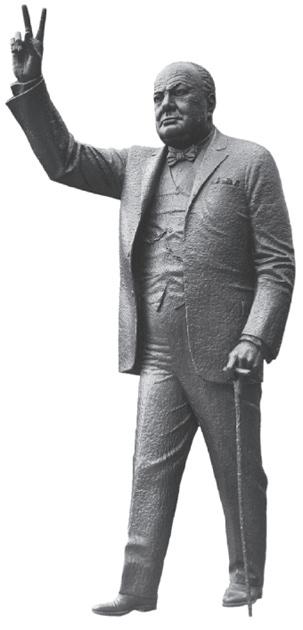
• Conservation Officer
• Teaching
• Academic librarian
• Solicitor
• Civil Service

In 2014, a CBI (Confederation of British Industry) and Pearson survey, "Gateway to growth: educational and skills survey" revealed that almost two thirds (65%) of businesses value foreign language skills among their employees, particularly in helping build relations with clients.
Language skills can be applied in a vast range of roles - the ability to communicate effectively beyond national boundaries is valued for example in sales and marketing, logistics, finance, insurance, hospitality and tourism, and from work in international organisations to teaching in local schools.
Spanish and French are wonderful languages, which genuinely have the power to change the entire course of your life, enriching it with new life experiences and knowledge of other cultures. GCSE will have already prepared you really well for the challenges of what is a much more exciting offer at A level. At Ormskirk, you will have a wealth of additional opportunities including work experience placements, exchanges, university visits and expeditions to far-flung corners of the world. This coupled with small class sizes means that classwork is tailored to your needs. You will also have one to one sessions with our Spanish Language assistant, an invaluable resource that not many colleges have. You will always feel 100% supported studying languages at sixth form!
1. Social issues and trends
2. Political and artistic culture
3. Grammar
4. Individual research project
5. Literature and film
There are 3 components:
Speaking: 21-23 minute discussion with examiner including 5 minute preparation time.
Listening, Reading and Translating: Comprehension recordings and texts based on authentic material.
Writing: 2 essays in Spanish or French on a book and a film.
The course covers how Spanish and Frenchspeaking societies have been shaped socially and culturally and how they continue to change.
In the first year, aspects of the social context are studied, together with aspects of the artistic life of Spanish and French-speaking countries. In the second year, further aspects of the social background are covered, this time focusing on matters associated with multiculturalism. You will also study aspects of the political landscape including the future of political life in the Hispanic and French speaking world by focusing on young people and their political engagement.
You will develop your knowledge and understanding of themes relating to the culture and society of countries where Spanish or French is spoken and your language skills. You will do this by using authentic spoken and written sources in Spanish and French. The choice of works (literary texts and films) offers opportunities to link with the themes so that, for example, the play La casa de Bernarda Alba could be linked to the sub-theme Modern and traditional values while the film Pan’s Labyrinth could be connected to the sub-theme Monarchy and Dictatorship.
The French book is “L’étranger” by Albert Camus. This ties in well with philosophy and other French speaking countries (Algeria). The film is “Au revoir les enfants” which deals with the treatment of Jews during the war, friendship and loss of innocence.
You will take part in stimulating activities to develop your linguistic skills alongside your understanding of the culture and society of countries where Spanish and French are spoken. We select a broad area of study to prescribe certain aspects for closer examination.
Paper 1 – listening, reading and writing
Paper 2 – an essay in Spanish/French on the film and one on the book
Paper 3 - speaking
5 GCSE at min grade 5 including 5 in GCSE Spanish / French
Languages may be central to some occupations, such as the diplomatic service, interpreting, translating, journalism, sales, teaching and tourism. In today’s global economy such opportunities are constantly expanding. Other openings may be in the media, the leisure industry, international organisations, business and customer care.
Languages graduates are found in a wide range of professions in the private and public sectors, including international agencies and government bodies (national and European).
I decided to stay at Ormskirk Sixth Form because many of my favourite teachers from main school would continue teaching me in the subjects that i had chosen to take, including French and Spanish. I have always really enjoyed languages and still believe they are something that everyone should have a go at learning. Since starting French and Spanish, I knew it was something i’d want to continue with into the future, through GCSE and now A-level. I will hopefully be studying languages and Politics at university and will be able to take the skills i have gained throughout my time studying languages in school and the Sixth Form into a career in the future.
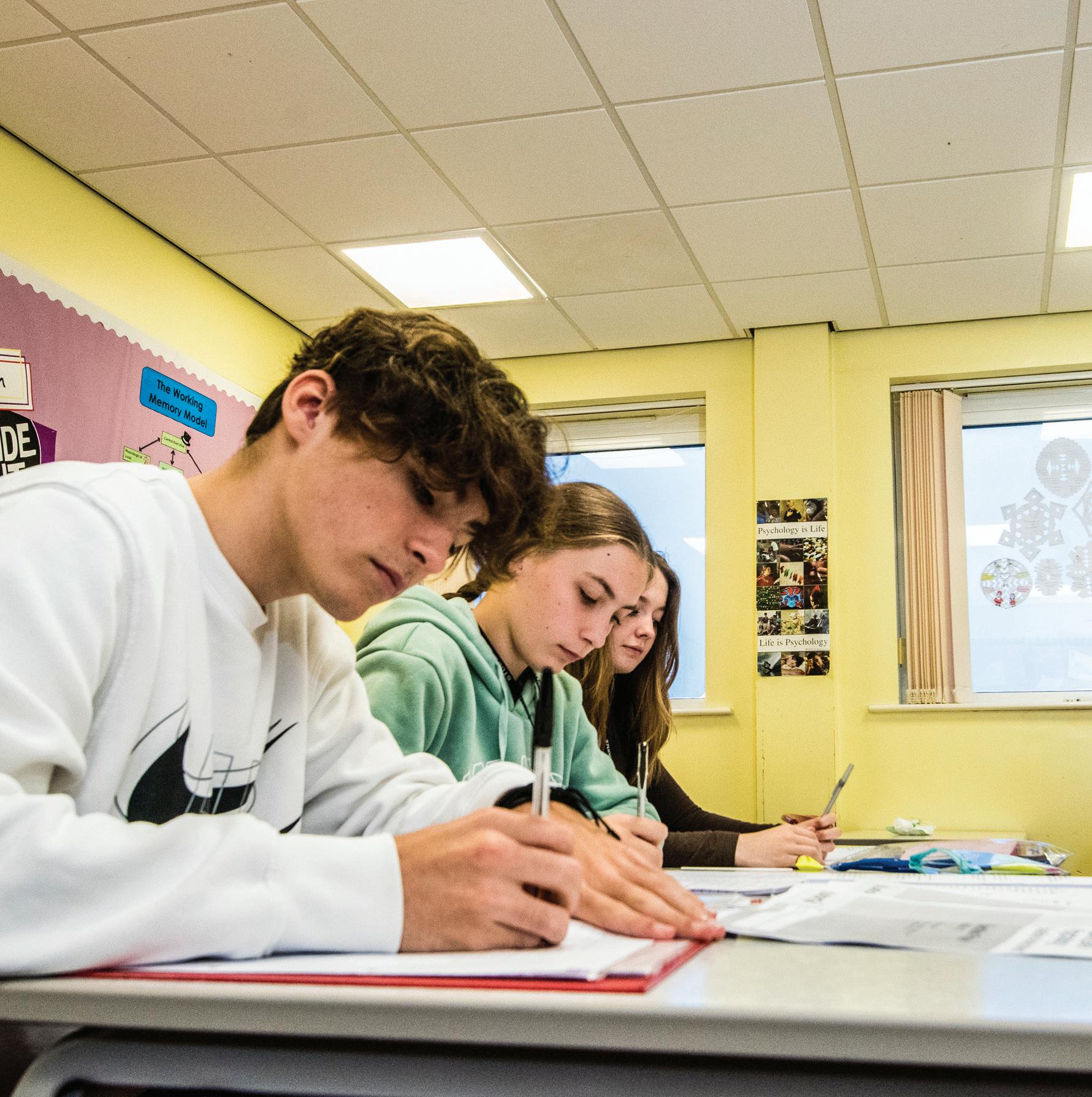
Maths A level is well respected by admission tutors for all degree subjects and future employers
Students will follow the Edexcel A Level Maths course. There are no optional topics; all students nationally are now expected to study two modules of Pure Maths (algebra) and one module of Applied Maths (a mixture of Statistics and Mechanics). Problem-solving, proof and modelling will now feature far more significantly and students will also be expected to analyse a large data set.
Assessment is based solely on exam performance. In Y12, students will sit an end of year exam, but this will not contribute to their final grade. In Y13 students will sit exams based on the whole two year’s study. There will be three exam papers; two for the Pure Maths and the other for Applied Maths.
The study of Mathematics at this level requires dedication, resilience and hard work. As the subject is academically challenging, students wishing to follow an A Level course in Mathematics must have obtained at least a grade 6 in GCSE Mathematics. Additionally, a pack of summer preparation work will be given to all Y11 students who have indicated that they are likely to be studying Maths when in Y12.
Students will follow the Edexcel A Level Further Maths course. This course is partly self-taught, with students attending two timetabled lessons each week.
A Level Further Mathematics has a simple 50:50 split between the compulsory and optional elements:
• Compulsory - Pure Maths
• Optional elements - Statistics / Mechanics / Decision/ Further Pure
Problem-solving, proof and modelling will now feature far more significantly.
The study of Further Mathematics requires dedication, resilience and hard work. To follow an A Level course in Further Mathematics students must also be studying A Level Mathematics. As the subject is academically challenging, and as the course is partly self-taught, students must have obtained at least a grade 7 in GCSE Mathematics.
Assessment is based solely on exam performance. In Y12, students will sit an end of year exam, but this will not contribute to their final grade. In Y13 students will sit exams based on the whole two year’s study. There will be four exam papers; two for the Pure Maths and one each for the two Applied Maths topics.
I decided to join Sixth Form because it offered me flexibility and independence that you don’t get at any other college. I also find that the smaller class sizes are a much better environment to learn than a crowded classroom. My favourite subject has to be maths because there are so many ways you can find the answer, it’s not linear. I would definitely recommend it to anyone who enjoys problem solving and logical thinking. A level maths is certainly a step up from GCSE but with that comes new topics that are much more interesting.
For students not studying A level mathematics, we offer the opportunity to study AS Mathematics over two years as a 4th subject. This qualification (which is equivalent to ½ an A level) is of particular benefit to those students who plan to study a subject at university which has a significant maths content (for example: sciences; economics; psychology; electronics; computing).
Mathematics is a facilitating subject (i.e. one of the subjects most commonly required or preferred by universities to get on to a range of degree courses).
It is a fascinating and exciting subject area, playing a major role in the modern world. It is essential for the advancement of modern technology, the sciences, medicine, economics and education. It is required in the fields of data processing, operational research, statistics and computing. Thus there is a need for mathematicians in industry, commerce, the public services, research establishments, administration and management.
This course is designed for students who play an instrument and/or sing. During the course, you will make significant contributions to group performances in a range of styles and disciplines. You will develop your teamwork skills and expand your knowledge and experience of musical genres. There will be opportunities to practise and develop your skills on the instrument you play and you will be taught music theory, to enhance your understanding of melody, harmony and rhythm. Lastly, you will develop a working knowledge of a range of freelance employment opportunities and the skills required to compete in this competitive field including health and safety and legal requirements.
On this course you will develop your skills as a musician. Instrumentalists and singers that play various instruments can develop all of those skills in this course. You will increase your versatility throughout the course, as well as understanding the context of the music you are playing. Performance skills such as interaction with the audience, knowledge of how to use your equipment, and how to deal with problems on stage professionally are explored regularly on this course.
There are many life skills that you will develop from this course, such as problem solving, improvement in confidence, working as a team and taking yourself out of your comfort zone. Academically, there are a range of degree courses around the country that develop this course further, at universities and at specialist music colleges.
Some examples: there are opportunities for sessions performing on tour, session recording, music composition, music composition for films and games, music composition for advertising and marketing, vocal and instrumental private coaching, and teaching and community workshop organisations.
4 GCSE min grade 4 including 4 in GSCE music and maths or English

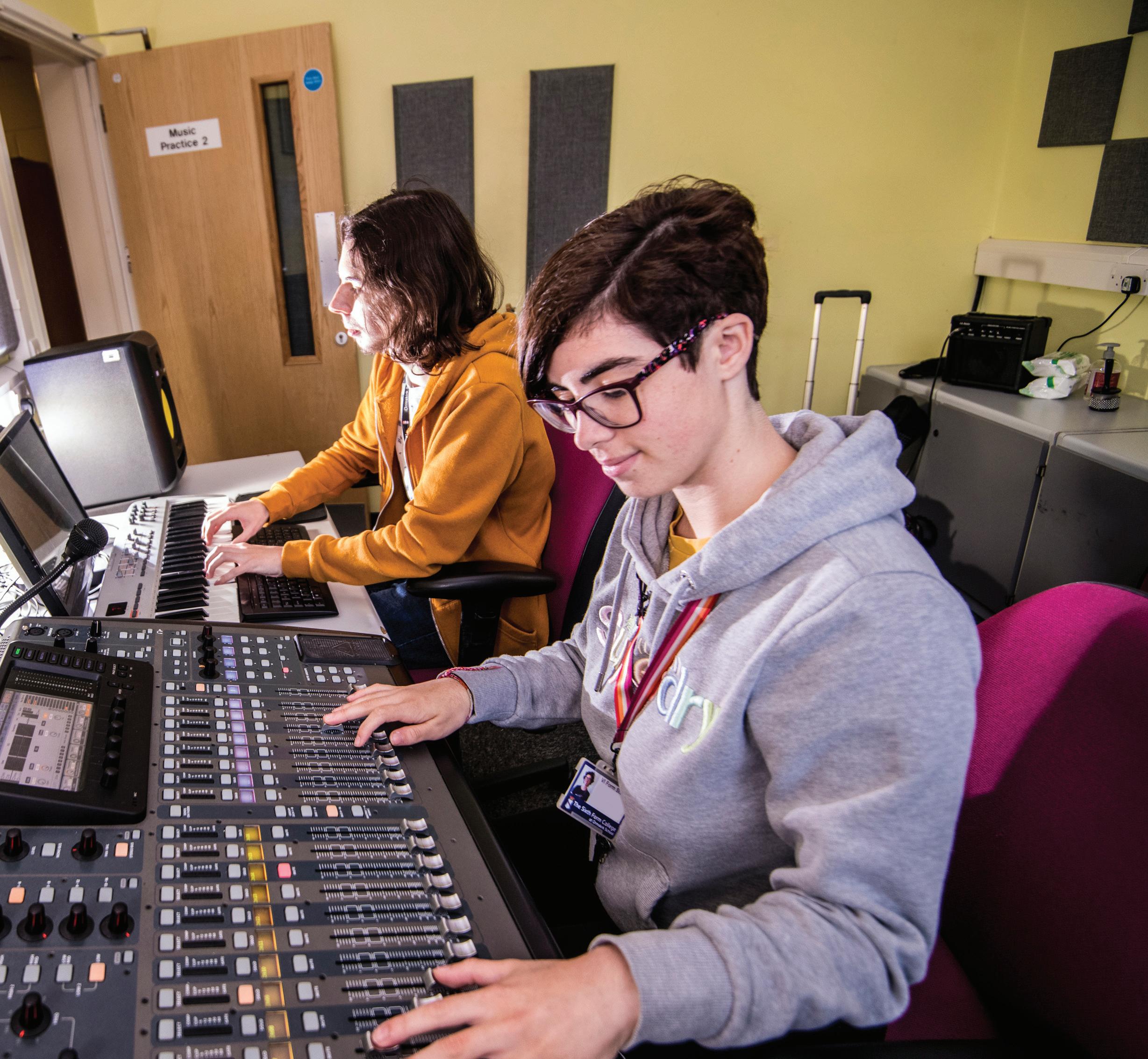
Students completing the A-level in music have gone on to study a wide range of careers including: engineering, English and law. Those specifically interested in musical careers have taken opportunities in:
• Drama,
• Film Studies
• Journalism
• Administration
• Publishing
• Radio
• Television
• Recording Technology
• Speech and Music Therapy
• Performing
• Teaching
• Composing
• Arranging and Editing.
I chose to attend the Sixth Form as I absolutely loved my time at Ormskirk School and couldn’t imagine being anywhere else. Choosing music was a no-brainer due to my passion for the subject and to lead to me accomplishing the dream I’ve had throughout high school - studying music at university.

The OCR A Level in Physical Education develops knowledge, understanding and skills relevant to physical education. Students gain understanding of the scientific and socio-cultural factors that underpin physical activity, and demonstrate their ability as either performer or coach. The course will enhance students’ existing interest in sport, as well as further develop their understanding of scientific related components of sport and contemporary issues in the media. Students will particularly enjoy the variety that the course contains and relish the opportunity to specialise in a practical option.
The course provides students with the exciting opportunity to gain a deeper understanding of PE and sport and its impact on both themselves and the community around them.
This qualification is studied though a range of different contexts:
1. Physical performance and mental preparedness
2. Use of drugs and PEDs and the ethical implications involved
3. The use of technology within sport and how we can use the data to aid our performance.
The students can choose to either as a perform or coach a sport or activity through the nonexam assessment component in a wide variety of practical activities.
Students are encouraged to take part in a variety of sports and activities to further their own understanding of the part sport and physical activity play in our day to day lives.
The A Level course is split into 5 sections. There are 3 written examinations at the end of year 13 complemented by a practical assessment and oral presentation.
The 5 sections are:
• Paper 1 - H555/01 Physiological factors affecting performance – (30%)
• Paper 2 - H555/02 Psychological factors affecting performance – (20%)
• Paper 3 - H555/03 Socio-cultural issues in physical activity and sport – (20%)
• Practical Assessment - H555/05 Practical Performances – (15%)
• Oral Presentation - H555/06 Evaluating and Analysing Performance for Improvement(15%)
Level 2 Distinction on the CNAT Sport Science or a level 6 GCSE PE.
In choosing this course, students will develop the knowledge to equip them for undergraduate study in areas such as Physiology, Biomechanics, Psychology, Nutrition and course linked to the sports industry. It will also provide students with a platform to apply for sports related apprenticeships, such as a Sports Coach.
Sport is regarded as a valued academic qualification, it provides an excellence basis for a university degree in sports science, sports management, healthcare or exercise and health, as well as any other academic degree. It can also complement further study in biology, human biology, physics, psychology, nutrition, sociology.

The A Level is designed to provide a coherent and thought-provoking programme of study, whilst also acting as a rigorous course which prepares learners for progression to Higher Education. This qualification is designed to nurture the development of critical and reflective thinking with the aim of developing a greater understanding and appreciation of religious beliefs and teachings, as well as the disciplines of ethics and philosophy of religion. Emphasis is placed on critical analysis and the construction of balanced, informed arguments within the context of a religious, philosophical and ethical awareness There is no coursework, but students will have plenty of time to develop their written skills for the exams.
The subject content for A level Philosophy & Ethics is divided into 3 components:
1. Philosophy of religion
2. Religion & Ethics
3. Development in religious thought
There will be 3 exams. Each for 2 hours weighted 33.3% of total A Level.
Philosophy of religion Learners will study:
• ancient philosophical influences
• arguments about the existence or non-existence of God
• the nature and impact of religious experience
• the challenge for religious belief of the problem of evil
• the nature of the soul, mind and body
• the possibility of life after death
• ideas about the nature of God
• issues in religious language.
Religion and ethics Learners will study:
• normative ethical theories
• the application of ethical theory to two contemporary issues of importance
• ethical language and thought:
• debates surrounding the significant ideas of conscience and free will
• the influence on ethical thought of developments in religious beliefs and the philosophy of religion.
• religious beliefs, values and teachings, their interconnections and how they vary historically and in the contemporary world
• sources of religious wisdom and authority
• practices which shape and express religious identity, and how these vary within a tradition
• significant social and historical developments in theology and religious thought
• key themes related to the relationship between religion and society.
Students wishing to study this A level must meet the school’s standard entry requirement. It is also recommended that Philosophy & Ethics students have at least 5 GCSE at min grade 5 including 5 in GCSE RE
Philosophy & Ethics
A level is regarded as a valued academic qualification in most Russell Group universities and may serve as a springboard to various careers such as Medicine, Law, PPE or Journalism.

Physicists explore the fundamental nature of almost everything we know of. They probe the furthest reaches of the earth to study the smallest pieces of matter. Join them to enter a world deep beneath the surface of normal human experience.
First year of A-Level
- Measurements and their errors, Particles and radiation, Waves, Mechanics and energy, Electricity.
Second year of A-level
- Further mechanics, Thermal Physics. Fields, Nuclear Physics and Astrophysics.
There is no coursework on this course. However, your performance during practicals will be assessed. There are three exams at the end of the two years for A-level, all of which are two hours long. At least 15% of the marks for A-level Physics are based on what you learned in your practicals.
Physics, like all sciences, is a practical subject. Throughout the course you will carry out practical activities including:
• investigating interference and diffraction of
laser light
• measuring acceleration due to gravity
• investigating systems that oscillate
• investigation of the links between temperature, volume and pressure
• safe use of ionising radiation
• investigating magnetic fields.
These practicals will give you the skills and confidence needed to investigate the way things behave and work. It will also ensure that if you choose to study a Physics-based subject at university, you’ll have the practical skills needed to carry out successful experiments in your degree.
5 GCSE at min grade 5 including 6 in GCSE physics
According to bestcourse4me.com, the top seven degree courses taken by students who have an A-level in Physics are:
• Mathematics
• Physics
• Mechanical Engineering
• Computer Science
• Civil Engineering
• Economics
• Business.
I chose to study Physics at A level simply because I’ve always found it incredibly interesting and I love how vast the field is, from looking into the smallest particles that make up the world to the grand scale of the universe and the laws that govern it. I just really enjoy learning about the subject and I think that’s important when picking options and future career paths.
After Sixth Form I’m hoping to study Physics at university and ultimately get a career in engineering as I would love to make a difference to people’s lives.
Studying A-level Physics offers an infinite number of amazing career opportunities including:
• Geophysicist/Field Seismologist
• Healthcare Scientist, Medical Physics
• Higher Education Lecturer
• Radiation Protection Practitioner
• Research Scientist (Physical Sciences)
• Scientific Laboratory Technician
• Secondary School Teacher
• Meteorologist
• Structural Engineer
• Acoustic Engineer
• Product/Process Development Scientist
• Systems Developer
• Technical Author.
You can also move into engineering, astrophysics, chemical physics, nanotechnology, renewable energy and more, the opportunities are endless.

If you have a love of sport, whether it be playing, watching, reading or coaching, then this is the ideal course for you. We offer an exciting curriculum, delivered by experienced and supportive teachers who share your passion and enthusiasm for the subject.
Btec Sport is a 2 year course, equivalent to 1 A Level comprised of 4 units totalling 360 guided learning hours. Three of the units are mandatory and two of the units are externally assessed. Students will develop theoretical knowledge and apply it to sports performance.
Anatomy and Physiology (120), Fitness Training and Programming for Health and Well-being (120) and Professional Development in the Sports Industry (60).
Optional Units (60)
One from, Sports Leadership, Application of Fitness Testing, Sports Psychology or Practical Sports Performance.
Level 2 pass on the CNAT Sport Studies or a level 4 GCSE PE.
Students can progress onto degree courses in Teaching, Sports Coaching, Sports Nutrition and Physiotherapy. This course would also prepare students who aren’t considering university, but are interested in higher apprenticeships or employment in this ever-growing field of work.
I have always been sporty and represented the school in lots of extra curriculum teams, and play several sports outside of sixth form as well as really enjoying the theory side of the course. I knew I wanted to study at Ormskirk Sixth Form because I already knew the staff well and not only are they brilliant teachers but they are very supportive and are always happy to help. In the future I hope to study physiotherapy or something allied with medicine in the sports sector.
Sport is regarded as a valued academic qualification, it provides an excellence basis for a university degree in sports science, sports management, healthcare or exercise and health, as well as any other academic degree. It can also complement further study in biology, human biology, physics, psychology, nutrition, sociology.
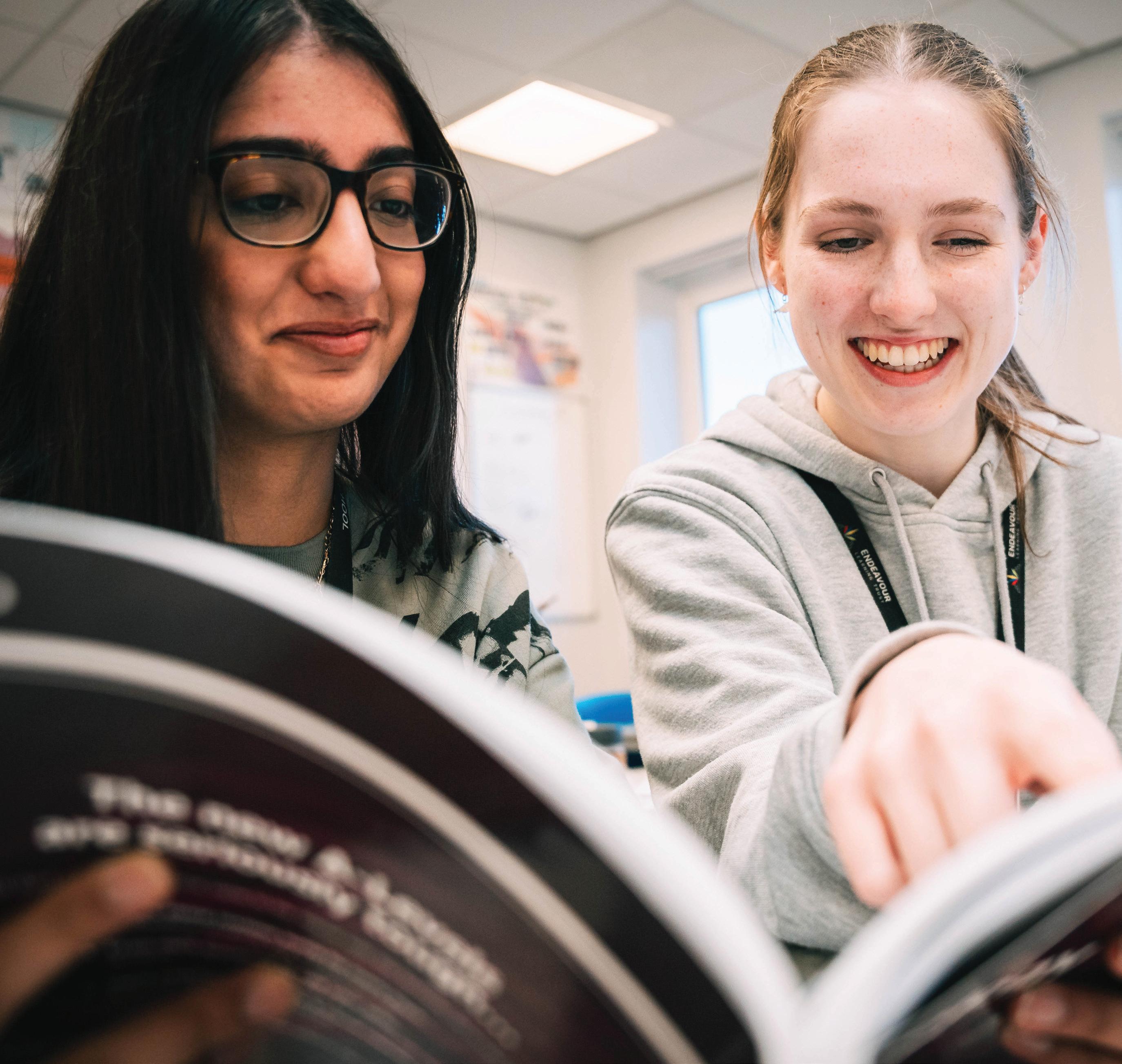
Psychology is the scientific study of human behaviour and experience. It is about individual people, what they do and how they interact. During the A-level course students gain knowledge and understanding of some important ideas and concepts, have opportunities to develop a variety of skills and learn how to apply the scientific approach to this area of study. Psychology fits well with a wide range of A-levels.
Social Influence / Memory / Attachment / Psychopathology
Approaches in Psychology / Biopsychology / Research Methods
Biopsychology (cont’d) / Research methods (cont’d)
Relationships / Schizophrenia / Forensic Psychology
Issues and debates in Psychology
Experience suggests that to be successful in A-level Psychology students will need to have passed English and Maths GCSE at grade 5 or above and Science with a minimum of a 5 grade along with the usual sixth form entry requirements. In addition, students should have:
• an ability to read and synthesise difficult material
• skills in gathering and organising data
• the ability to make notes and write extended answers
• genuine curiosity about how and why people think/behave the way they do
• Are eyewitness testimonies to a crime or accident accurate & reliable?
• What is psychopathology?
• Why do people suffer from certain disorders?
• Why do people conform and obey?
• What affect does the media have on aggression?
• How does gender develop?
Assessment is based purely on examination performance. There are three exam papers which combine the various topics from the course and each is worth 33.3% of the total A-level grade. Each exam will be taken at the end of year 13 and they are 2 hours long.
• Clinical Psychology
• Forensic Psychology
• Educational Psychology
• Occupational Psychology
• Counselling Psychology
• Health Psychology
• Neuropsychology
• Teaching & Research
• Wellbeing Practitioner
• Advice Worker
• Careers Adviser
• Chaplain
• Counsellor
• Detective
• Education Consultant
• Life Coach
• Market Researcher
• Mediator
• Play Therapist
• Policy Officer
• Psychotherapist
• Social Worker
• Human Resource Manager
• Media Roles
The Choices Are Vast
I have always been interested in why people do the things they do. Psychology is a difficult subject but it is so interesting that you work hard by choice. Topics I have enjoyed this year are Attachment, Memory and Psychopathology. All the lessons are varied so it doesn’t get boring, even on the least interesting topics. There is always somebody there to support you if you are stuck and the classes are small so you have more time with the teacher.
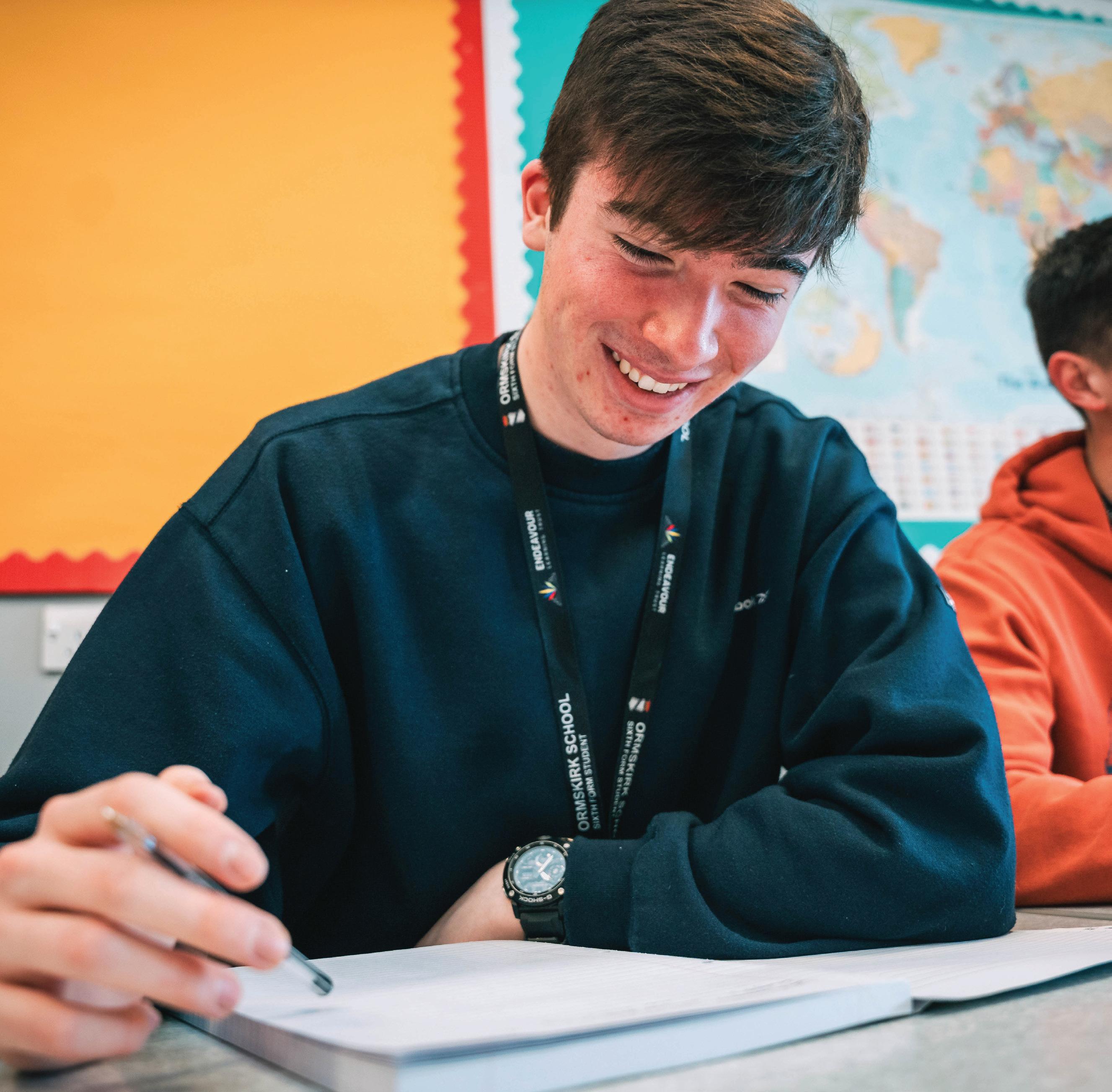
Studying sociology offers insights into social and cultural issues. It helps you develop a multi-perspective and critical approach to understanding issues around culture, identity, religion, crime, families and social power. More than once during the course you’re bound to ask yourself the question, “why has society developed like this? With poverty, ignorance, crime and injustice.”
1. Education and methods in context: You’ll the role of education in society. For example as part of your studies you’ll look into gender and ethnicity differences in school achievement. You’ll also learn how to apply your own sociology research methods to the study of education.
2. Research methods: You’ll learn how to conduct your own sociological research, from interviews to reviewing documents and official statistics.
3. Culture and identity
4. Crime and deviance with theory and methods: You’ll learn about criminal and deviant behaviour, including factors that might lead a person to follow this path in life and how the media portrays them
5. Theory and methods: you’ll expand on your knowledge of research methods and study theory and methods.
6. Beliefs in society
At A-level there are three exams, each account for one third of your A-level grade. The three exams last 2 hours and are worth 80 marks each. The exams consist of a mixture of short answer and extended writing questions.
Students wishing to study this A level must have at least a Grade 5 in English literature/language at GCSE level.
Sociology is a great choice of subject for people who want a career in social work, nursing or medicine. But the subject is also useful in a number of other careers, like marketing, advertising, PR, journalism, law or teaching.
Possible degree options
According to bestcourse4me.com, the top six degree courses taken by students who have an A-level in sociology are:
• Sociology
• Psychology
• English studies
• Business studies
• Law
• Teaching.
Open University
• Biology and Chemistry
[view to zoology]
UCLAN
• French
• Midwifery
Edge Hill University
• Geography x2
• Mechanical Engineering
• Finance
• Computer Science
• International Business
• Primary Education
with QTS
• Management
University of Liverpool
• Chemistry with Foundation Year
• Chemistry
• History & Politics
• Computer Science
Liverpool John Moores
• Geography
• Business Management
• Access course Business
Management
• Biomedical Science
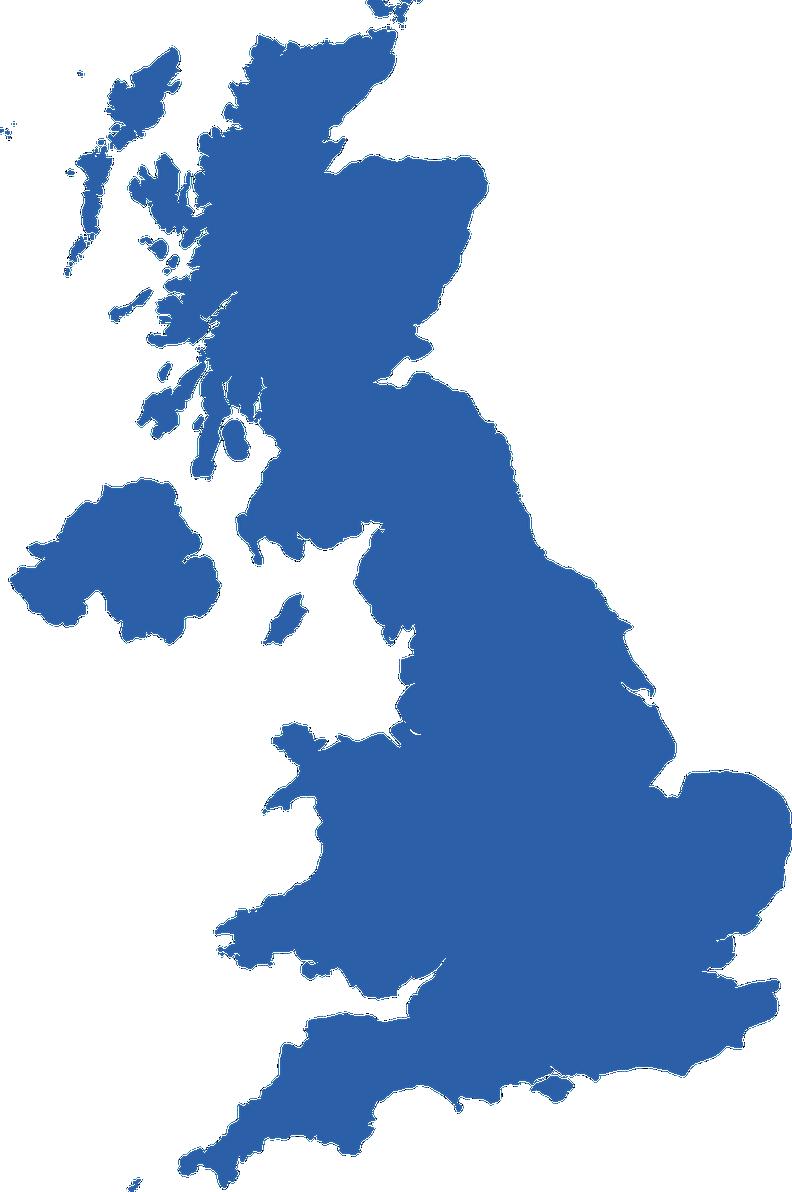
NHS
• Medical Engineering Royal Hospital
Manchester
Metropolitan University
• Law
• Business
University of Chester
• History
University of Salford Dance
Harper Adams
• Agriculture
Bangor
• Psychology
University of South Wales
• Live Event Technology
University of Central London
• Royal Central School of Speech and Drama
The majority of our students go on to study for a degree at university. As you will see on page ** these universities can be local or far flung, on occasion in different countries. The degrees that are pursued are also varied. Last year many chose to stay relatively local and are now studying at Edge Hill, Liverpool or Manchester while others have begun their study at York, London Kings College, Leeds, UCLan or Italia Conti.
There are some fantastic apprenticeship programmes available and we ensure that this pathway is explored as much as university so that students are aware of all options that are available to them after sixth form. Last year’s year 13 students have begun their apprenticeship programmes Account Management and Marketing, Engineering, Pension Administration and Business management.
Some students leave sixth form and enter the world of employment. This can be temporary before they head to university or an apprenticeship or they can be keen to start work and climb the ladder within their employment.
No matter what our students want to do after sixth form we work hard to ensure that they are as informed and prepared to make the decision that is best for them. We are equally proud of them all.
